By Chris Giacoumakis
Sharing some insight into the gifts 2022 has delivered.
What a year it has been!
As the tinsel begins to weave around banisters, Christmas trees and Christmas lights begin to flash reminding us that the festive season is nigh. The colour and vibrancy are also accompanied by the endless demands of our energy and time; tying loose ends, and doing our best to appease others. The festive season can sadly transform from a time of joviality to one that is all-consuming, which may leave us feeling far more taxed – in every way – hence the urgency to carve out some time to take stock of what is important and what this season truly represents.
2022 has been a whirlwind of a year, and if there is something we can take away from it is that we could all learn to slow down, to turn inward, and to take better care of ourselves. However, as the end of the year approaches, it is almost inevitable that we will begin to do the opposite. With endless invitations, gifts to buy, packages to send, cards to write, a long list of to-dos to tick off, and last-minute projects to complete, we are often left feeling depleted, drained and lose sight of the important lesson we were gifted with this year.
As caregivers, community leaders, neighbours, and teachers it is important that we instil the true value and meaning of Christmas and model it accordingly. This time of year is about reconnecting with those we have potentially lost touch with, or have forcefully been separated from due to the pandemic and its subsequent restrictions. Perhaps this Christmas, especially in Australia, should be really appreciated more than ever, especially given international travel has resumed – allowing loved ones to reunite and the opportunity to make more memories – allowing us to make up for the time we lost apart!
Perhaps Christmas 2022 will reinforce one particular inalienable truth: experiences are what we etch into our heart and minds as we grow older – they are what we truly learn to hold close and provide a map of our past, present and future. They bridge the gap between generations and can often lead to stronger bonds. So this Christmas, instead of putting more pressure to consume, perhaps we should pause again, ration out our time wisely, and focus more on connecting with those that matter the most. Sharing laughter, good food, banter, and experiences – all which are gifts that will keep on giving and hold the true essence of Christmas.
Whether we believe in the magic of Christmas or not, we can take action to create magic in our own lives, the lives of our loved ones and take a huge dose of gratitude and simplicity into 2022.
We wish you all a joyous, safe, and memorable Christmas, hope to see you in the best of health and spirits in 2023!
Debates are a great way to teach students critical thinking and public speaking skills, while also helping them engage with current events. However, it can be challenging to find topics that are appropriate for young debaters. To help out, here are some kid-friendly debate topics that are both informative and engaging, collected and developed by the Chief Adjudicator of the Australian National Debating Championships for 2023, our coach Leah Mercier!
Looking for some engaging public speaking topics? Check out our blog on speech topics here!
Types of Debating Topics
Debating topics for kids can be classed into two main groups: policy debates and non-policy debates (which are often referred to as ‘empirical’ debates).
There are other types of topics – such as actor debates – but these are the two main types most students are exposed to!
Policy Debates
These types of debate topics involve discussing a proposed policy, action or law. Examples include whether the government should increase taxes to fund public education, or if the minimum wage should be increased for all workers.
How to spot a policy debate topic
When a debate topic is written as “That we should…” or “This house would…”, it is usually a policy debate!
There are some instances where it may not include the word ‘should’ (or ‘would’), and there are also times when topics that include those words could also be non-policy topics – it’s important to do a quick sanity check whenever you receive a debate topic to ensure that it’s asking you to change the world in some way (more details on that below!).
What is unique about a policy debate?
In policy debates, the affirmative team proposes a change to the world through a specific plan (also known as a ‘model’). If you’re interested in learning more about how models work, you can learn plenty in the below Conquering Debating video:
It’s important to remember that, in these types of debates, the debate topic implies that the affirmative (who are usually representing the government implementing some sort of policy) have the political capital (the money, time, and resources necessary) to execute their plan. The debate should be focused on whether or not the implementation of this policy would make the world a better place.
Non-Policy (‘Empirical’) Debates
These types of debate topics involve making a value judgment about the world by examining facts and evidence to draw conclusions. Unlike policy debate topics, they don’t ask the affirmative to change the world in any way – instead, they ask the affirmative team to prove (comparatively) that the value statement in the topic is true, whilst the negative team attempts to prove (again comparatively) the opposite.
Examples include determining whether books are better than movies, or whether the country is better than the city.
The point of a non-policy debate is not to design a model or plan to change the world but to examine something that already exists and persuade the adjudicator whether the statement made in the debate topic is true or not.
Given the added complexity of these debate topics, they are more often used at a university level than at a school level (but definitely feature in many school competitions at least a few times a year).
How to spot empirical debate topics
Empirical debates will always be phrased as a statement that could be proved true or false, and tend to include the word ‘is’ or ‘are’ (although, like policy topics, this isn’t always the case), such as ‘celebrities are poor role models,’ or ‘water is the best drink’ (these are both examples of a sub-type of topic called ‘value’ topics).
Other times, they will be written as ‘That x is better than y’ (e.g. ‘that nuclear power is better than renewable energy,’ or ‘that dogs are better than cats’) – these are a different sub-type called ‘comparative’ topics, as whilst they do involve a value judgment, it is very clear which two things you’re comparing.
Additionally, some non-policy topics in international competitions or different debating formats are written as ‘this house believes…’, ‘this house supports…’ or ‘this house regrets…’ – it is unlikely most students will be exposed to this wording, but it’s good to be aware of its existence!
Debating Topic Areas
Debating topics for kids can also be grouped according to their Topic Area. Topic areas are used in debating to ensure that students debate lots of different subjects over the course of a competition.
We hope you enjoy this updated list of debating topics for kids in 2023, which we have grouped by topic area!

Education Debating Topics for Kids 2023
- That all exams should be replaced with assessment tasks.
- That homework should be banned.
- That electronic devices should be banned in the classroom.
- That computer skills should be assessed by standardised testing.
- That coaching colleges (e.g. Speaking Schools Australasia) should be banned.
- That single-sex schools should be banned.
- That private schools should not receive government funding.
- That school uniforms should be banned.
- That school classes should be grouped based on ability rather than age.
- That all examinations should be made open-book.
- That devices at school do more harm than good.
- That university education should be free.
- That religion should not be taught in schools.
- That from Year 10 onwards, the education system should be divided into an academic stream and a vocational stream (e.g. hairdressing and plumbing).
- That parents should financially reward their children for improving personal school results.
- That all university students receiving professional degrees (e.g. medicine, law, veterinary studies) should be required to work in a rural area for 2 years after graduation.
- That we should abolish the ATAR and all other student rankings.
- That school should start later to take into account adolescent sleeping patterns.

Environment Debating Topics for Kids 2023
- That we should ban single-use plastics.
- That cars should be banned in the CBD (central business district).
- That public transport should be free.
- That we should introduce a carbon tax.
- That nuclear energy is the best way to combat climate change.
- That wind turbines should be banned in national parks.
- That air travel should be taxed more heavily.
- That international trade agreements should be based on environmental considerations.
- That genetically modified food should be banned.
- That all public buildings must meet environmental standards.
- That countries should be required to accept climate refugees proportionate to the amount of carbon they emit.
- That tourism should be banned in national parks.
- That we should ban people from building new properties in areas with high risk of natural disasters.
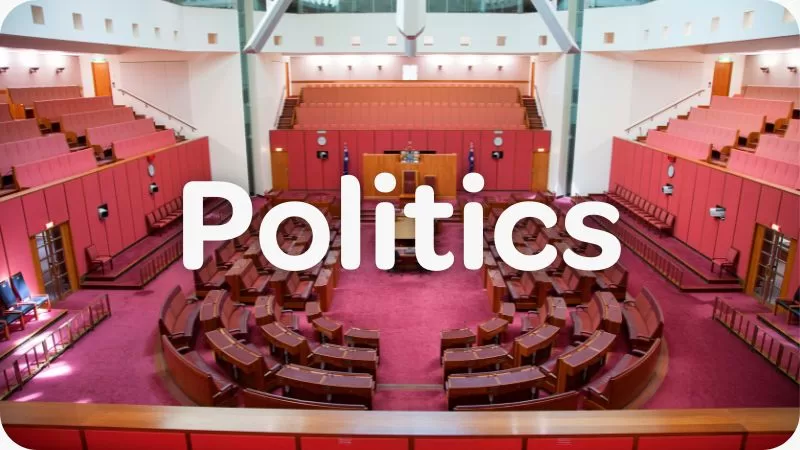
Politics Debating Topics for Kids 2023
- That candidates for political office should have to pass a competency test.
- That we should introduce term limits for politicians.
- That the voting age should be lowered to 16.
- That there should be a quota for Indigenous representatives in parliament.
- That there should be a 50% quota for women in parliament.
- That voting should not be compulsory.
- That there should be a universal basic income.
- That the media should not report on the private lives of politicians.
- That the government should have a quota of young politicians (under 30).
- That politicians and their families should be required to use public services (e.g. public schools and public hospitals)

Economics Debating Topics for Kids 2023
- That there should be a universal basic income.
- That we should allow emergency workers to strike.
- That we should lower the minimum working age.
- That all year 11 and 12 students should be required to complete a volunteer position or a part-time job alongside their studies.
- That stay-at-home parents should be paid a wage by the government.
- That employers should be required to provide an equal amount of maternity and paternity leave.
- That there should be a quota for women on corporate boards.
- That the government should impose lower tax levels on people who live a healthy lifestyle (e.g. regularly exercising, not smoking, not drinking).

Health Debating Topics for Kids 2023
- That all citizens should have access to free healthcare.
- That terminally ill patients should be allowed to trial experimental treatments before they have been approved by medical authorities.
- That employees should be entitled to annual mental health leave in addition to existing sick leave and annual leave allowances.
- That we should introduce a sugar tax.
- That smoking should be banned.
- That vaping should be banned.
- That private healthcare should be banned
- That all employers should be required to provide their workers with access to free exercise facilities.
- That the government should establish and fund a separate healthcare system run exclusively by and for indigenous people.
- That all Australians should have access to free dental care.
- That doctors should be required to prescribe generic medications before more expensive brand-name medications.
- That all school canteen menus should be set by government health experts.

Sport Debating Topics for Kids 2023
- That contact sports should be banned for children under 16.
- That we should legalise performance-enhancing drugs in international sports.
- That we should ban alcohol advertising in sports.
- That female and male sporting leagues should receive equal government support.
- That we should ban specialised sports high schools.
- That playing a team sport should be compulsory in Primary School years.
- That the captains of national sporting teams should be elected by the community.
- That sporting stars are paid too much.

Law & Order Debating Topics for Kids 2023
- That school punishments should be decided by a group of senior students and teachers.
- That we should suspend students that fail to report bullying.
- That parents should be held responsible for the crimes of their children.
- That poverty should be a defence against crimes of acquisition (such as theft and fraud).
- That we should decriminalise vandalism.
- That we should increase the use of restorative justice rather than punitive punishment for certain crimes.
- That police should be required to wear body cameras while on duty.
- That all police officers should have a minimum level of education (e.g. a degree).
- That there should be an independent review board to investigate allegations of police brutality or misconduct.
- That all incarcerated individuals should have the right to vote.

Media Debating Topics for Kids 2023
- That news outlets should be required to provide balanced coverage of all political candidates in the lead-up to elections.
- That the government should introduce stricter regulations on advertising targeting children.
- That all social media platforms should have an age limit for use (e.g. 16 or 18).
- That television channels should be allowed to broadcast shows that contain violence, as long as they are classified correctly.
- That all major news outlets should be required to provide accurate and unbiased coverage of major events.
- That the government should increase funding for public broadcasting networks.
- That streaming services should have the same content regulations as television channels (e.g. no explicit content).
- That media organisations should have to disclose all sources of their funding.
- That news outlets should be required to provide more diverse representations of minorities in the media.
- That social media companies should be held accountable for regulating hate speech on their platforms.
- That parents should have the ability to preview or restrict content their children can access online.
- That we should introduce a tax on streaming services to fund local content production.

International Relations Debating Topics for Kids 2023:
- That we should ban tourism to states with poor human rights records.
- That voluntourism (the act of volunteering in a foreign nation as a tourist activity) should be banned.
- That the Olympics should not be hosted by developing nations.
- That all students should be required to study a foreign language in school.
- That foreign aid should be tied to human rights targets.
- That all asylum seekers to Australia should be processed in Australia.
- That international sporting events should be depoliticised.
- That countries should be allowed to pay other nations to take refugees and asylum seekers on their behalf.
- That developing nations should be exempt from international carbon emission targets.
- That there should be one permanent host city for the Olympics.
We hope you’ve found this resource useful for practising your debating skills or even hosting your very own debate!
If you’re ever wondering what topic to set for your next debate, make sure to check out our updated list of debating topics especially written for kids.
Good luck and happy debating!
So you’ve signed up for a public speaking competition or you’ve received a speech assignment at school, and you’ve been given a ‘topic area’ that your speech needs to be related to. But what exactly is a topic area and how do you interpret it?
Topic areas are the broad themes that public speaking competitions will use to guide their contestants in writing a speech. These topics can be anything from sports, to current affairs, to history and culture. It’s up to the individual speaker to take these topics and make them personalised and meaningful to them.
When it comes to public speaking competitions, one of the most important things you need to do is interpret the topic area into a personalised topic that has meaning to you. This can be a tricky task, but don’t worry, we’re here to help!
This blog post will teach you everything you need to turn a topic area into an amazing personalised speech that you and your audience will love.
The first step is to understand what the topic area is used for. In most cases, the topic area will be a broad theme that the competition organisers want you to speak about. For example, common topic areas include simple phrases that capture a common human experience.
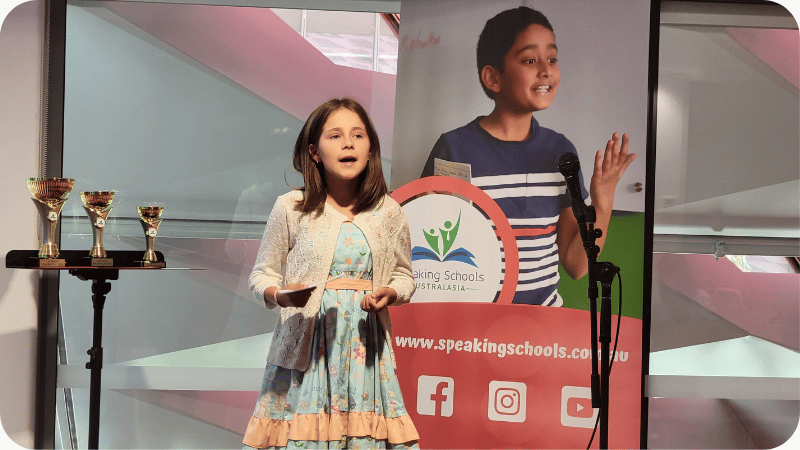
Examples of Public Speaking Topic Areas
Some speech topic areas may include:
- Real wealth is never measured by money
- The world is a smaller place these days
- If I could change the world
- The meaning of belonging
- The process of discovery
- The importance of leadership
Once you know what the topic area is about, it’s time to start thinking about how you can personalise it to become the perfect speech topic for you. This is where you can get creative!
Turning a broader speech topic area into a speech topic that you love to talk about is an important step that makes the process of giving a speech fun and rewarding. Most topic areas lend themselves to a whole variety of interesting speech topics. You could write a funny speech, a persuasive speech, an informative research-based speech, or one that is tailored to your audience!

Here are some tips to help you personalise your topic:
- Think about your own experiences and how they relate to the topic area.
- Identify a problem that you feel passionately about and how the topic area can help address it.
- Come up with an original angle or perspective on the topic area.
- Think about how the topic area can be interpreted in a unique way.
If nothing jumps out at you straight away, there are a few strategies you can use to distil the broader topic of the competition into a clever interpretation that suits you perfectly. Keep reading to find out what to do to come up with interesting speech topics for your speech competition.
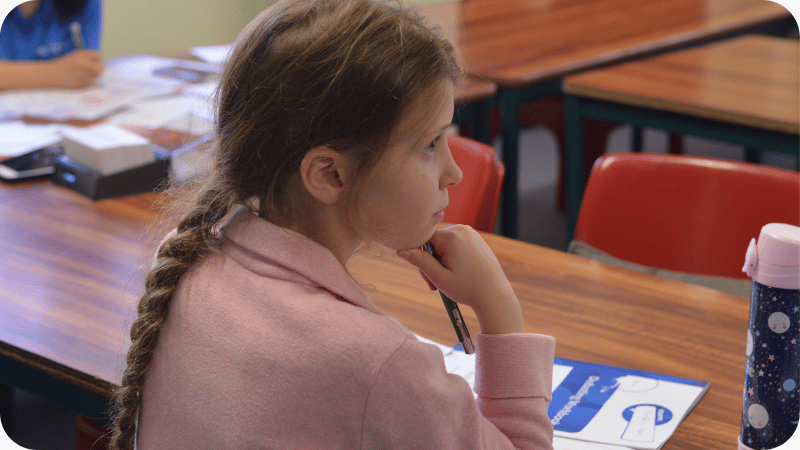
Strategy #1: Analyse the topic
The first step is to break down the topic area into smaller parts. For example, if the topic area is “The world is a smaller place these days”, you could break it down into the following subtopics:
- How technology has made the world smaller
- The pros and cons of a smaller world
- How to adjust to a smaller world
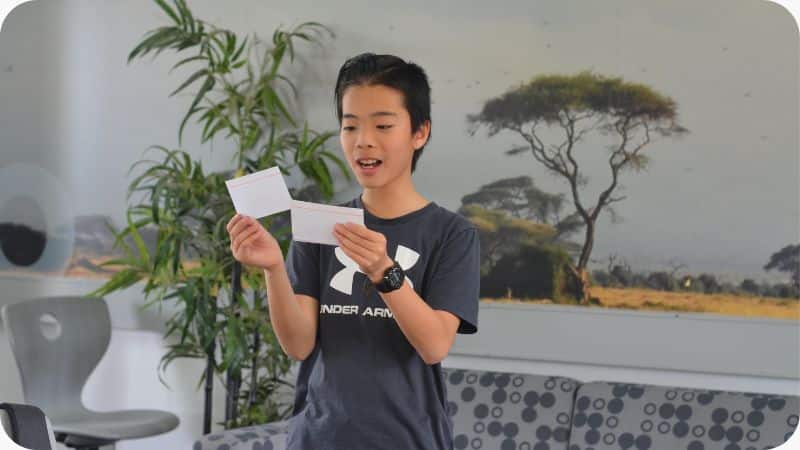
Strategy #2: Get personal
Think about how the topic area affects you personally. For example, if the topic area is “The process of discovery helps us to meet ourselves”, you could interpret it as follows:
- How the discovery process has helped me to understand myself better
- What I have learned about myself through discovery
- How the discovery process can help others to understand themselves better

Strategy #3: Think abstractly
If you’re struggling to come up with a personalised topic, it can be helpful to think about the topic area in an abstract way.
Once you have a personalised topic, the next step is to make the link between your topic and the topic area clear to the judge. This can be done by using keywords from the topic area in your speech. For example, if the topic area is “The world is a smaller place these days”, you could use keywords such as “globalisation”, “connectivity” or “interconnectedness” in your speech. This will help the judge understand how your topic is relevant to the topic area.
Strategy #4: Mindmapping
Mind mapping can be a wonderful tool for coming up with a unique idea for your speech. Mind mapping is a creative process where you map out all your ideas on paper. It can help you brainstorm and make connections between different topics and ideas. So how do you mind map your way towards a great speech idea?
Start by writing down the topic area at the centre of a page. Then draw lines radiating outwards, and start jotting down ideas related to the topic area as they come to you. You can also draw arrows connecting different ideas together to create a network of related topics. This process can help you uncover unexpected connections between different aspects of the public speaking competition topic area and generate unique ideas for your speech.
Strategy #5: Start with an Anecdote
Storytelling is a huge part of human communication. When we tell stories, we can teach lessons and pass on our wisdom in an interesting way that engages all of our listeners in an immersive learning process. When you get assigned a topic area for a public speaking competition, a great strategy is to start telling an anecdote about the topic and see where it takes you. An anecdote is a personal experience that offers an interesting perspective on the topic area. To come up with an anecdote, think about your own experiences that are related to the public speaking competition topic area. Then when you are writing, try to focus on the emotions and details that will help bring the story to life.
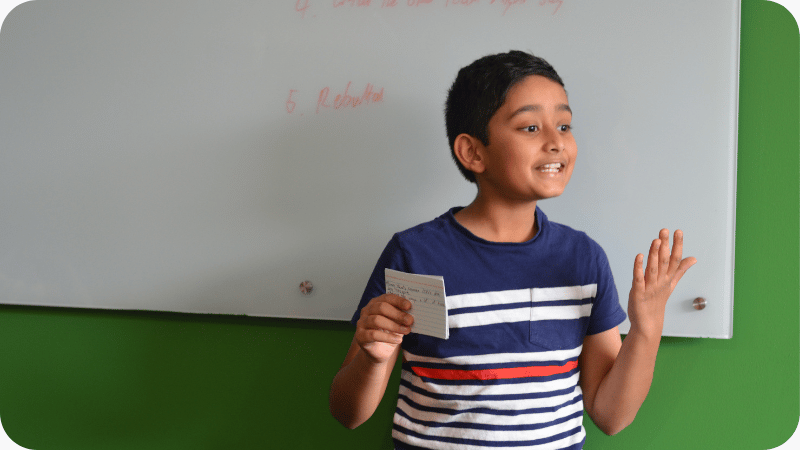
Strategy #6: Creative Writing
If you want to go down a creative route and come up with an original interpretation of the public speaking competition topic area, then creative writing can be a great way to do this. Start by brainstorming as many ideas related to the public speaking competition topic area as possible. Then take one idea and write it in the form of a story or poem. This will help you to come up with a unique and creative take on the public speaking competition topic area that can then be used as the basis of your speech.
Strategy #7: Read the news with the topic area in mind
It can be helpful to read the news with public speaking competition topics in mind. This will help you stay up to date with current events, and find inspiration for public speaking ideas. For example, if the public speaking competition topic area is “The benefits and drawbacks of technology”, then you could search for stories on how technology has impacted different people’s lives. Reading stories like this can help you find evidence and personal examples to use in your public speaking competition speech.
How to Interpret Impromptu Speaking Prompts
Finally, it’s essential to be prepared for impromptu speech topics. These are topics that you will be given at the start of the competition, with no prior warning. While they may seem daunting, they are actually a great opportunity to show off your public speaking skills! You can be prepared for this by coming up with potential interpretations of different public speaking topics before the day of the competition. You can do this by breaking the public speaking topics down into their basic components and exploring different meanings that could be found within them. This will help you come up with creative ways to interpret public speaking prompts when they are presented to you so that you can confidently crack the impromptu speech topic on the day.
We hope that this blog post has given you some helpful tips on how to interpret topic areas for public speaking competitions. Good luck!
Last weekend was an exciting one for Speaking Schools Australasia, as we held our very first internal public speaking competition. With 22 finalists being selected from 75 registered competitors across three age divisions, the competition was fierce. The theme of the speeches was ‘making a difference’ and the finalists were asked to deliver their speech on a topic related to this theme.
Our two judges, Adrian and Nida, had a big job selecting only three winners from each age division. The judges had a tough time deciding between all the exceptional speeches, but in the end, we found our three winners from each division— Josiah (Stage 1), Samouel (Stage 2), and Mar (Stage 3). We would like to thank everyone who came along to support these amazing young speakers. Congratulations to all finalists—you made us so proud with your passionate speeches on making a difference!

What Is The Speaking Schools Cup?
The Speaking Schools Cup is a public speaking competition that encourages students to practice their speaking skills and express their ideas in front of an audience. This year’s theme was “Making A Difference”, which gave contenders the opportunity to explore how they can use their voices to bring positive change in their schools or communities.
The competition was divided into three divisions: Stage #1 (Years 1 & 2), Stage #2 (Years 3 & 4) and Stage #3 (Years 5 & 6). All participants were judged on criteria such as manner (body language, eye contact, vocal variety and overall delivery), matter (the content of their speech) and method (speech structure). Stage #3 students were also judged in an Impromptu Category, in which they were given 5 minutes to prepare a speech on the topic ‘The Power of a Smile’. And while there can only be three winners per division, everyone who competed shone brightly with their remarkable speeches. Make sure to keep reading to see the full lists of finalists and winners from this year’s competition!

Making A Difference Through Public Speaking
Public speaking is an invaluable skill that can help you make a lasting impact in your community. Not only does it give you confidence and self-assurance, but it also teaches you how to effectively communicate your own unique point of view. By learning how to articulate your message in an effective way and reach out to others through your words, you can truly make a difference and inspire change in your community.
Public speaking is a critical skill that helps children build confidence as they grow up. It teaches them to take risks, think critically about complex topics and share their thoughts in front of an audience—all important skills that will serve them well for years to come. Even if your child isn’t competing in talking competitions like this one, you can still help them hone their public speaking abilities by encouraging them to talk about something they’re passionate about or ask questions during class discussions at school.
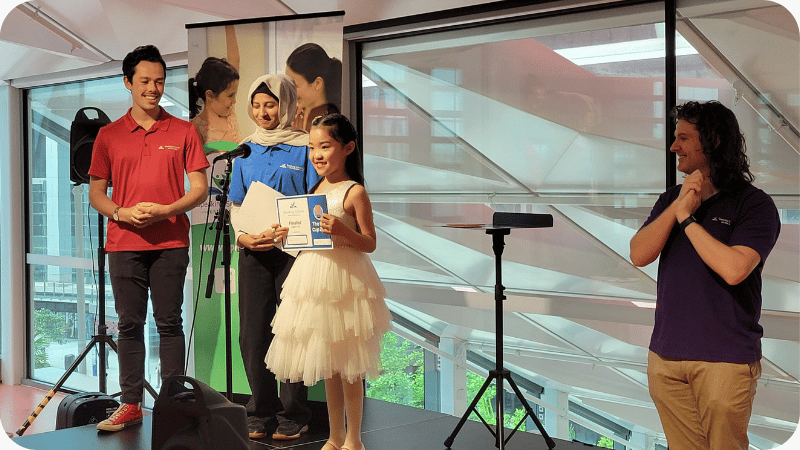
At Speaking Schools Australasia, we believe that every child should have access to public speaking education as part of their schooling curriculum. We strive to provide children with the tools they need for success by teaching them how to speak confidently in front of an audience, how to organize their thoughts into logical arguments or stories, and how to use language effectively when delivering their speech. Our aim is for every student enrolled at our schools to become not just proficient speakers, but confident communicators too!
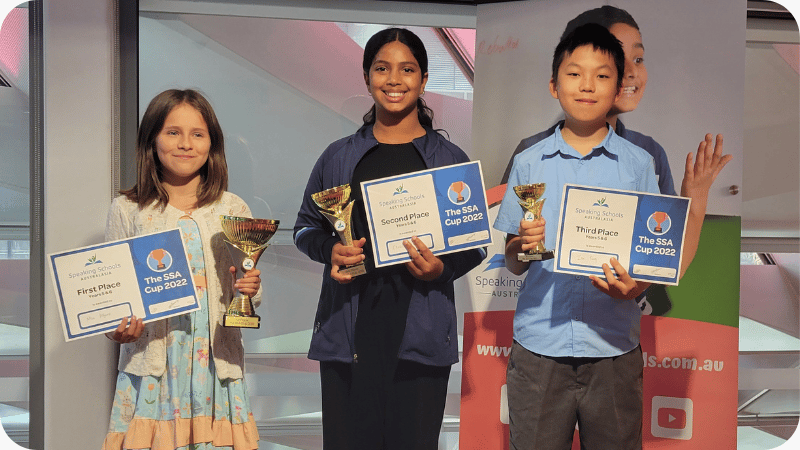
The Speaking Schools Cup
The Speaking Schools Cup was created with these values in mind. We wanted this competition not only to be fun and rewarding for participants but also to be a chance for students who are passionate about public speaking to hone their skills even further. Through this competition we wanted students to learn about different topics related to ‘making a difference’ whilst also having fun discussing them with others who share similar interests. There were some fantastic entries from each division which made judging especially difficult! Congratulations again to our winners Josiah, Samouel and Mar—we hope you continue pursuing public speaking opportunities in future!
Finalists and Winners of the SSA Cup 2022 (Full List):
Stage #1 (Year 1 & 2)

Congratulations to the 8 Finalists Selected for the Stage #1 Division of the SSA Cup 2022!
Josiah – First Place
Chloe – Second Place
Avyan – Third Place
Hugo – Special Award
Gemma – Finalist
Jeevan – Finalist
Tara – Finalist
Joanna – Finalist
Stage #2 (Year 3 & 4)

Congratulations to the 8 Finalists Selected for the Stage #2 Division of the SSA Cup 2022!
Samouel – First Place
Sarvesh – Second Place
Lydia – Third Place
Jessica – Special Award
Leon – Special Award
Timothy – Finalist
Anna – Finalist
Catherine – Finalist

Stage #3 (Year 5 & 6)
Congratulations to the 6 Finalists Selected for the Stage #3 Division of the SSA Cup 2022!
Mar – First Place
Chrissa – Second Place
Ian – Third Place
Aditya – Special Award
Hazel – Finalist
Namie – Finalist
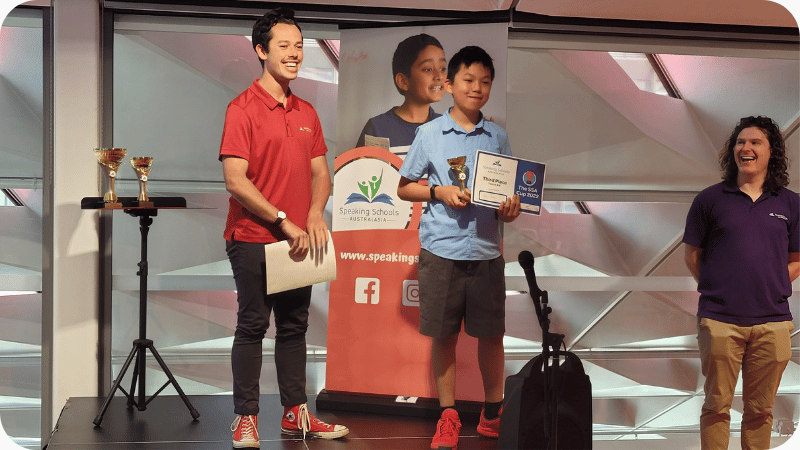
Making A Difference Through Public Speaking is an incredibly powerful way of creating real change within communities. It requires hard work and dedication but provides huge rewards both personally and professionally. At Speaking Schools Australasia we believe that every child should have access to public speaking education as part of their schooling curriculum so that they can develop into confident communicators who can make meaningful contributions within their community. Congratulations again to our winners Josiah, Samouel and Mar—we hope all our finalists take away something valuable from this experience! Thank you again for supporting us during this event – here’s looking forward to many more successful competitions yet to come!
The Art of Competition
What do you feel when you hear the word ‘competition’? Do you feel anxious, excited, motivated, fearful, energised or simply sheer terror? Do you feel a surge of motivation pump through your veins? Are you uncomfortable?
We all feel differently when we are faced with competition, or about to charter into ‘competition territory’, for a number of reasons – mostly stemming from our self-worth, potentially positive or negative past experiences, and whether the motivation to win is intrinsic or extrinsic – to name a few.
Competitions have been around for millennia. Think back to the Ancient Greeks – they loved their competitions and kicked off this passion by hosting the very first Olympic Games dating back to 776 BCE! The desire to compete and win, to reap rewards, celebrate, bathe in glory and victory, as well as be humbled and learn from losses – these are a fundamental part of human existence. Although coming out with a loss as opposed to victory may not always be received well, when any form of competition is approached with a positive and healthy mindset, it can be a highly effective tool for growth, evolution, and ultimately a pathway to building and bolstering one’s resilience.
Being competitive can be frowned upon by many, including ourselves. We may have negative associations with someone who is competitive or feel a surge of shame take over when we feel competitive, especially when we are around peers we have bonded with. The other problem is we often associate negative character traits with competitive people that are often antisocial and not ideal. Competitive people may be perceived to be ruthless, selfish, self-serving and all about short-term rewards. However, is this really the case? Are we potentially confusing healthy competition with hyper-competitiveness?
If we really think about it, life itself is full of competitions and whether we like it or not, we are inevitably part of competitions – not only against others but also against ourselves. So, we need to try and embrace it, reframe our perspective around competition and being competitive, and explore the benefits it can bring. That is not to say ultra-competitiveness can be detrimental and toxic, but it is more about approaching competitiveness from a balanced and healthy angle. So we thought we’d help kick off that process by putting together a list of benefits on the art of competition and giving yourself(and our children ) permission to be competitive! Check out our list below:
It can help you manage your emotions better
Entering competitions – whether a short running race, fighting over the TV remote, playing a game of chess or entering a state-wide or national competition – is an opportunity to get to know yourself better, manage your emotions and learn how to work under pressure.
Before the competition starts, you should identify, sit with and work through the feelings you are experiencing in order for you to compete successfully.
Channelling that nervous energy or competition high (or alternatively processing the low) can all be wonderful tools for becoming more emotionally intelligent and resilient.
It is an excellent opportunity to test yourself
Many of us do several courses, classes, attend training, get private lessons – but despite this, we often never really have a way to test ourselves and genuinely see how far we come.
Entering a competition can be one way to help you identify and track your progress, as well as highlight areas that need further improvement.
Becoming aware of our progress (or lack thereof) can help boost motivation to keep going, try harder, consider new strategies and continue to blossom!
It can help deliver a dose of confidence and resilience
Getting yourself to step outside your comfort zone can be painfully hard and terrifying! It is by no means easy, but being a passive bystander in life can be just as hard and painful too!
By getting up and competing, you are sending a clear message to yourself and those around you: you believe in your abilities, skills and ability to recover no matter what! How empowering and incredibly brave is that?
So if you find someone you care about (or yourself) shying away from competition, remind them (or yourself) that by simply stepping up to the plate, they give themselves a healthy dose of self-love, respect and resilience. It is also simply a wonderful experience which the outcome can not negate!
You can make new friends
Whenever you find yourself signing up for a competition, you inevitably meet new people who are passionate about the same things as you – what a great way to build a new friendship! They do not have to only have to be one of your competitors, they can also become your new mate and part of your support network!
Not only have you pushed yourself out of your comfort zone, but have acquired new friends – how good is that?!
Winning feels awesome
Ok, let’s be honest – we all like to win! The buzz of winning can electrifying. Think about all the hard work you’ve put in, the time you have sacrificed, the torture you have subjected family and friends to along the way, the nervous energy, the adrenaline, the practice runs and now boom – you’ve walked away with the victory and the external gratification that comes along with that! There is no greater feeling than having your efforts and hard work appreciated, acknowledge and celebrated!
It feels incredible and fuels you to keep going and growing!
Embracing Competitiveness
There are plenty more benefits to list and explore here, but we thought we’d leave you with our top five. Ultimately, any competition is about you taking your power back, harnessing your nervous energy to do great things, and injecting yourself with healthy doses of self-love and confidence, but ultimately it teaches you to be resilient and rise up, again and again, no matter what.
In the wise words of the great and beloved Madiba:
“Do not judge me by my successes, judge me by how many times I fell down and got back up again.”
So now it is time to get up, again and again, and remember every time you do, you have already won. You are a more victorious and stronger version of your previous self!
Do you have a child who is nervous about speaking in public? Do you wish you could help them feel more confident and less anxious when they have to give a presentation or speak in front of a group?
It can be hard to figure out how to help your child be a better public speaker. Fear not! As experts in teaching public speaking and presentation skills to children, we are perfectly placed to help you help your child reach their full potential as a speaker.
In this blog post, we will discuss some tips that you can use to help your child become a better public speaker. We will also provide information on our wide range of public speaking courses for kids, which can be very helpful in boosting confidence and improving communication skills.
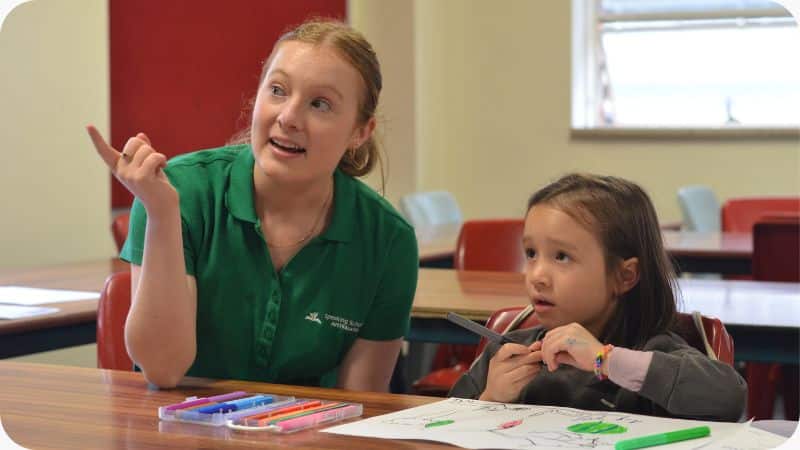
Help your child prepare for their speech by rehearsing it with them and providing feedback
If your child is getting ready to give a speech, there are a few things you can do to help them prepare. First, practice with them. Practice is a huge component of public speaking. Sometimes, the biggest skill difference between children of a young age presenting their speeches in class simply comes from the amount of supportive practice each child has had in the lead-up to the presentation. Regular practice increases self-esteem, reduces anxiety, and can help children to build confidence in their public speaking abilities.
Go over the speech together, and help them identify any areas where they may need more practice. You can also provide feedback on their delivery, and offer suggestions on how they can improve. This is a great way to teach public speaking skills like eye contact, how to stand, and how to speak with enough volume. Lots of communication skills are built through repetition. As a parent, you are uniquely placed to give your child an opportunity to pause and restart their speech with a greater emphasis on clarity or their level of enthusiasm – whatever it is they need to work on!
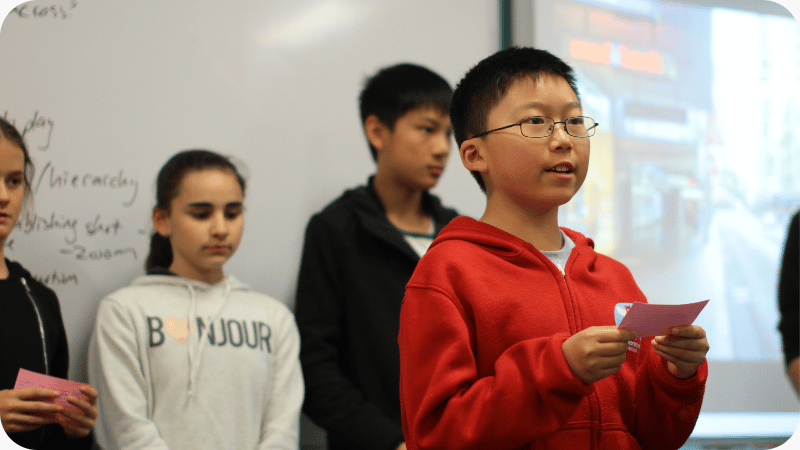
Give positive feedback to your child each time they finish speaking
Whenever your child finishes a run-through of their speech, be sure to give them positive feedback. This will help to encourage and motivate them to continue practising their public speaking skills. Let them know what they did well and offer constructive criticism for areas that need improvement. With your support, they will be able to build their confidence and become a more successful public speaker.
Every great presentation has a lot of work that goes on behind the scenes. For kids, in particular, parents and family play a huge role in this preparation. Making the time to listen to your child speak can help them develop into a great public speaker. After all, the importance of having fun and building up your ability before the big day of a speech cannot be understated. Parents who listen carefully to their children and help them to prepare can make a world of difference to their child’s experience of public speaking, and turn it into a joy rather than a lifelong fear.
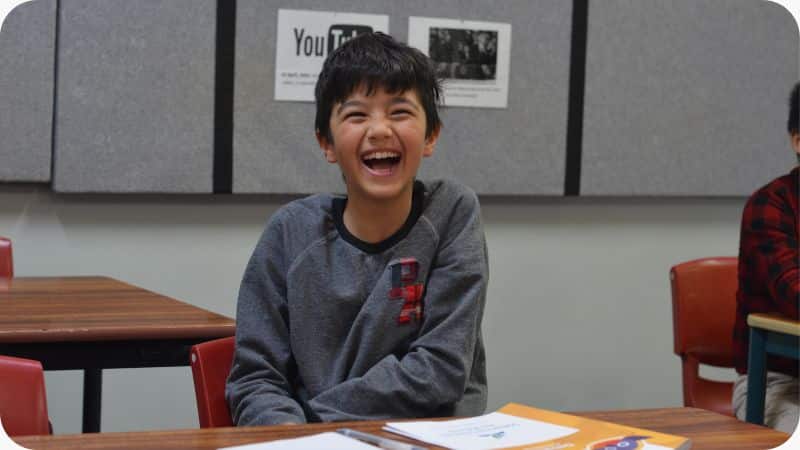
Encourage them to get involved in extracurricular activities that will help improve their public speaking skills
If your child is shy or introverted, you may be concerned about their public speaking skills. Luckily, there are some great extracurricular activities that can help kids improve their confidence and build up their ability to speak in front of a group. One option is to enroll them in public speaking courses for kids. These classes can teach them essential skills like how to project their voice, make eye contact, and use gestures effectively.
In addition, public speaking courses for kids provide them with the opportunity to practice in front of their peers in smaller groups than they would experience at school, which can help build their confidence. Additionally, exposing children to a teacher who is a great public speaker can be very helpful in showing them what good communication skills look like.

Most people never take the time to learn the vital skill of how to give a good presentation, so whether you get them involved at an early age or select a course for older children, public speaking courses are a great way to give kids a head start and will allow them to learn this vital skill early.
Outside of formal classes, there are also plenty of opportunities for public speaking practice for kids. For example, they could give a presentation at school, join a debate team, or even just participate in group discussions more often. By encouraging your child to get involved in extracurricular activities that involve public speaking, you can help them develop the skills they need to be successful in any presentation in the future. Make the time to talk with your child about how they found these experiences. Try asking your child what their favourite part of sharing their opinion with other people is. This can help them to focus on the rewards of public speaking and to see the fun in it rather than remaining overly focused on their nervousness.
There are many extracurricular activities that can help kids improve their public speaking skills, from intensive holiday programs to weekly after-school classes. If your child is interested in public speaking, encourage them to get involved in one of these activities. These courses and clubs will give them the opportunity to practice their public speaking skills in a safe and supportive environment designed specially to teach public speaking skills to kids and to help them build confidence. In addition, they will also learn how to handle nerves, project confidence, and engage an audience. With some practice, your child will be giving speeches like a pro in no time!
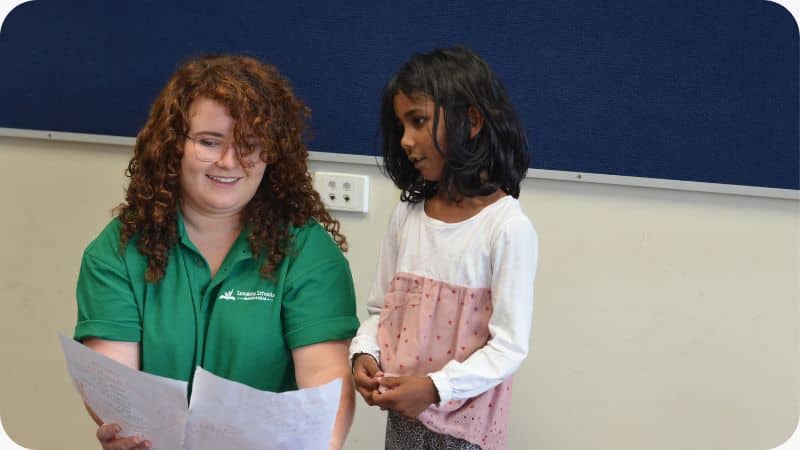
Teach them how to use proper body language when giving a speech
Anyone who has ever given a speech knows that proper body language is just as important as the words you say. Good posture, expressive hand gestures, and natural movement can help to engage your audience and convey your message more effectively. On the other hand, stiff body language can make you appear nervous and unenthusiastic, which can quickly lose the attention of your listeners. When teaching your child how to give a speech, it is therefore important to emphasise the importance of good body language. Help them to understand how posture, gestures, and movement can affect the way their message is received. Encourage them to practice in front of a mirror or with friends so that they can see how their body language affects their speech. With a little practice, they will be able to use body language effectively to engage and inspire their audiences.
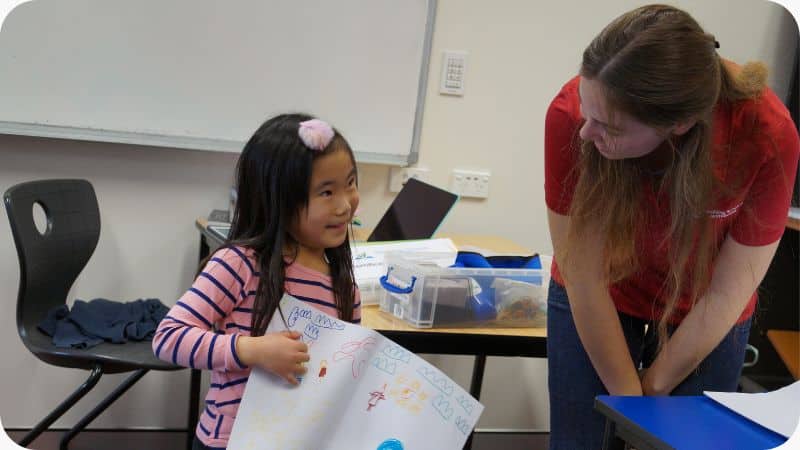
Help them stay calm and focused before and during their speech
Public speaking can be a nerve-wracking experience, but there are several techniques that students can use to stay calm and focused before and during their speech. First, it’s important to take some deep breaths and relax the body. Then, try to get them to focus on the positive aspects of the situation: the audience wants to hear what you have to say, and this is an opportunity to share your knowledge and ideas. It can also be helpful to tell your child to focus on one person in the audience and imagine that they’re having a conversation with them. Finally, remind them that everyone makes mistakes; if they do make a mistake, they can just correct themselves and move on. By using these techniques, they’ll be able to stay calm and focused during their speech, no matter what nerves may arise.
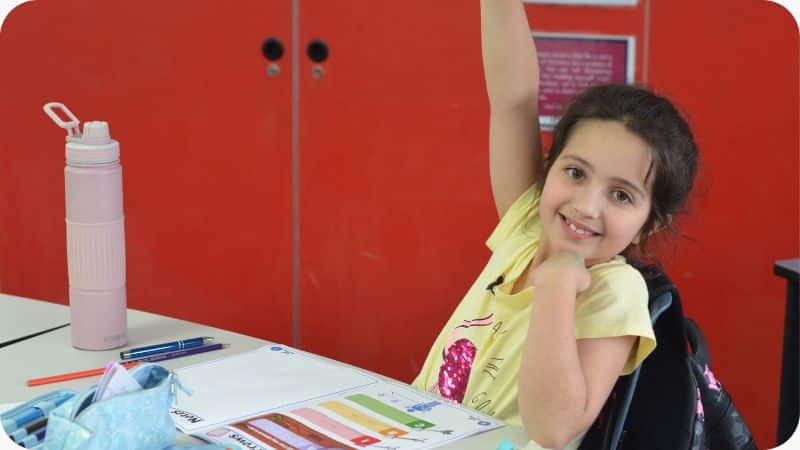
Giving a speech can be nerve-wracking, but it doesn’t have to be. With the right preparation and guidance, your child can give speeches that are confident, articulate, and engaging. If you want help preparing your child for their next public speaking opportunity, look into booking a program with us. We hope that the next time you speak to your child about public speaking, you feel confident that you can help them to become a better speaker.
It’s no secret that having the right idea or the right piece of information can help you immensely when it comes to preparing for a debate. After all, having something clear to say within your argument based on factual evidence from the real world can make it very difficult for the opposition to disprove. However, when we start preparing for a debate we are often not allowed to access any technology to find this invaluable information. All we can use is the knowledge that already exists in our heads! This is why it can be a huge advantage in debating to learn how to build up your general knowledge.
This blog post is going to help you to learn strategies that can improve your general knowledge about a whole variety of topic areas that are commonly seen in debates. You’ll learn the difference between useful information and information overload, how to keep track of all of the things you have learnt, and how to use these facts once you get into the prep room.
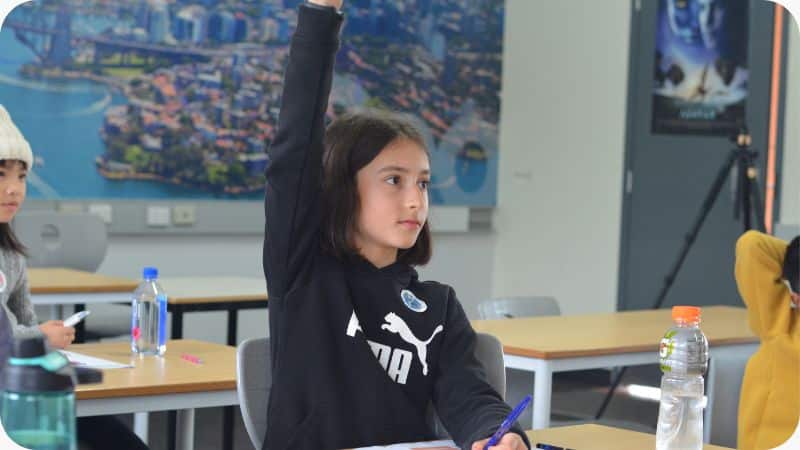
Learning about the world is a huge plus side of being a debater
General knowledge is one of the biggest advantages of participating in debating and carries through to many other areas of life. From having a conversation with somebody about an interesting and current topic area to being better able to understand the news about politics and the world around you.
If you want to learn more about how debating can massively boost your critical thinking skills and fill your brain with plenty of interesting fun facts, check out our blog post about how debating and public speaking can improve your critical thinking.

Why is general knowledge important for debating?
It is not strictly necessary to have a lot of true knowledge about a topic area in order to win a debate, but it can be immensely helpful. A lot of students often feel that their favourite topic area in debating is ‘education’ because they have the most experience with education (being students themselves) and therefore they know a lot about it! This means they have a lot of ideas for different arguments they might want to make during the debate.
If we apply the same principles to other topic areas such as the environment, politics, law or anything else, the more you know about it the more ideas you will be able to come up with during prep time before the debate. Sometimes it only takes one really simple and small piece of information to launch you into a path of creative thinking and imagination that can expand it into a fully-fledged debate-winning argument.
Therefore, you could say that your general knowledge is like an arsenal of weapons that you can build up in order to make better quality debating arguments in the future. It’s almost like collecting a toolbox full of different instruments and tools – you’ll never know which item you end up needing in the future!
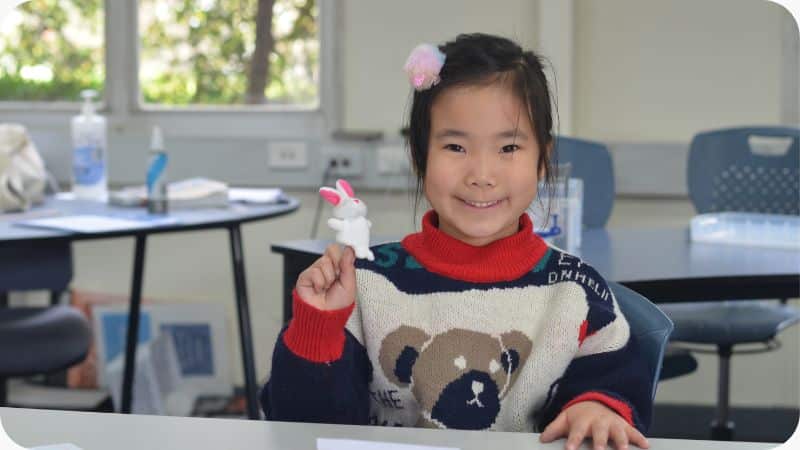
So how should I go about building my general knowledge?
Mindful Media Consumption
The first step to building up your general knowledge is to engage in more media consumption. One thing that is very useful is watching the news. This is an activity that can be easily adjusted for the age group that you’re in – try to find a news source that is targeted specifically at people from your age group such as ‘news for kids’ or perhaps ‘news for preteens and high schoolers.’ You can also engage in the same news that your parents do.

Watch from a debater’s perspective
When you’re watching the news, try to watch it from the perspective of a debater. Try to think to yourself, “How might this be useful in the future? What do I think is the most interesting part of this story?” and, “If it was up to me and I could change this issue, what would I do to change it?”
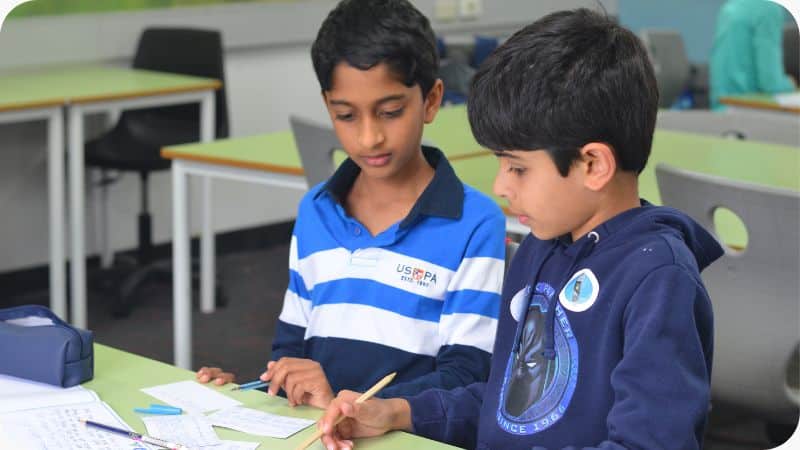
The people who write debating topics watch the news too!
The news is often the place where a lot of adjudicators come up with ideas for the topics they set. For example, if the Federal Budget had recently been announced there had been a massive impact on something such as the NDIS, an adjudicator might be interested in writing a topic about the amount of disability funding that is available in Australia.
Look for news that directly relates to common debating topic areas
The next tip is to look for news that directly relates to the common debating topic areas.
Common topic areas in debating:
- Environment
- Politics
- Law and Order
- International Relations
- Education
- Social issues
- Feminism
- Economics
- Sport
- General (which is used as a miscellaneous category for any other topical motions outside the usual categories)
One important strategy you might be able to use is to create a ‘Debating Book’ in which you have all of these topic areas as a heading of a different section. When you come across an interesting fact in any one of these areas, whether it be in a newspaper on the internet, write it down in your Debating Book in dot-point form so that you can start building up a physical copy of your information on each topic area. Some debaters refer to this as a ‘matter file’, which is a collection of useful knowledge and information that they can use as material in their speeches.
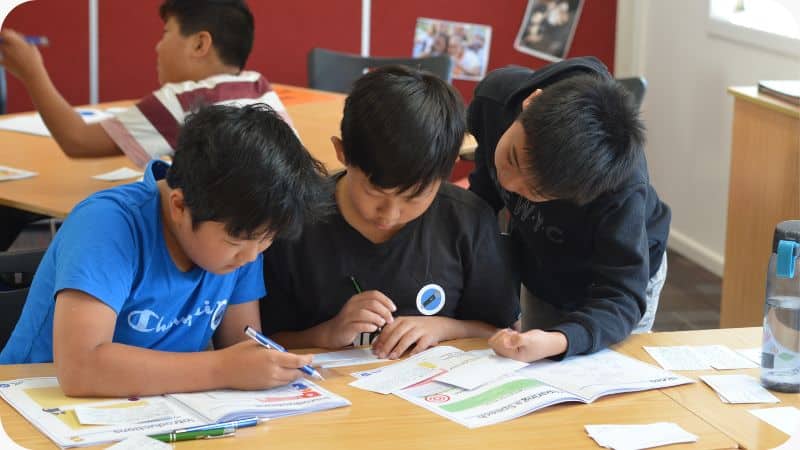
Learn your strengths and weaknesses
Keeping a debating book has a few benefits. As well as helping to encode the information into your memory, it can also serve as a physical representation of how much knowledge you have on different topics within debating. For example, you might have a very well-filled-out ‘education’ section because it happens to be your favourite subject, but you may not have ever written anything down in your economics section! This can be a really good clue that it would be hugely worthwhile for you to learn a little bit more about the economy or maybe do a quick google search about what the topical news in economics is right now. After all, it’s better to know a little bit about every topic than to be an expert in only one or two areas because you will end up winning more debates if you have ideas in every single round!
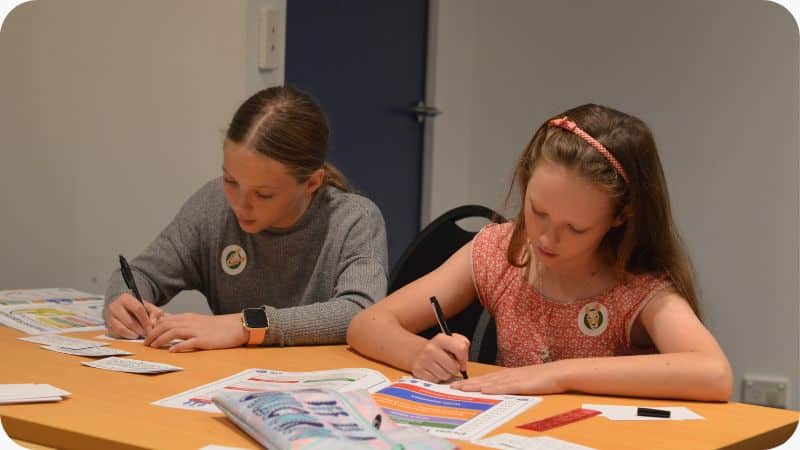
Apply your knowledge
Once you’ve started paying more attention to the media and the world around you, it’s time to start applying your knowledge to real-life arguments and debates. One exercise that you could do is ask yourself, “What is a debating topic that this piece of information might come in handy for?”
For example, if you collected a piece of information about the way that public school funding has changed over recent years, you could use that piece of information in the debate ‘That private schools should be banned.’ Try to go through most of the information in your book and imagine a topic or find a topic on the internet that would be relevant to the piece of information you have written down. If you’re super keen you could even practice writing out the argument using that piece of information.
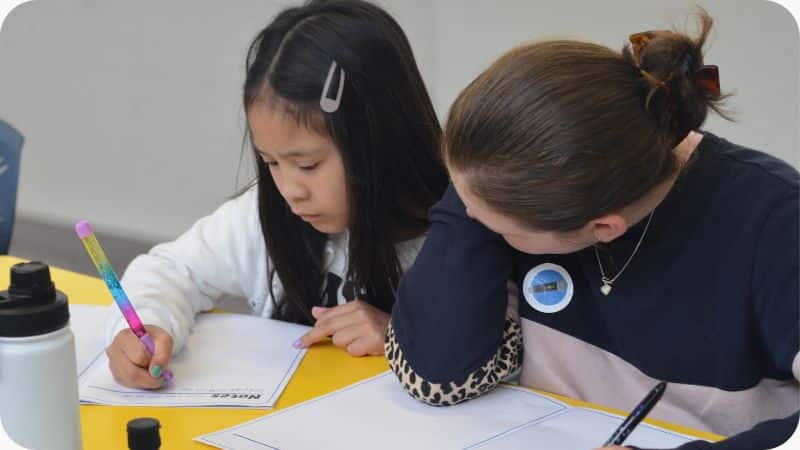
Where does the information belong in my speech?
When we have all of this general knowledge it can be confusing where to place it within a speech. The best idea is not to rely too heavily on your knowledge but to focus on logic and reasoning instead. We recommend using your knowledge and facts as examples for your point.
One perfect structure for doing this is the ‘PEEL’ structure. In ‘PEEL’, you have the Point, Explanation, Example, and Link. The ‘Point’ is the point title. ‘Explanation’ is a general logical explanation of what you mean by this argument. ‘Example’ is the perfect spot for some specific and factual information that can help to show why your explanation is true. Then you can use ‘Link’ to wrap up your argument, bringing the real-world knowledge back to the topic of the debate!
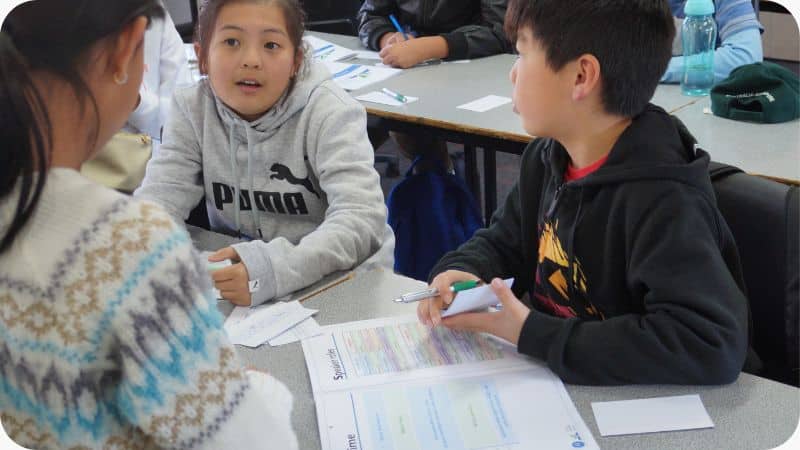
How specific should my information be?
A lot of the time, students can become confused about how specific the information they use in a debate should be. Kids can get very caught up in providing true information such as statistics or figures or the correct names and addresses of people that they are talking about. However, this practice of saying highly specific factual information isn’t actually the best idea and doesn’t make you more convincing in the debate. In fact, if your information is too specific, you run the risk of it being incorrect and out of date or sounding like you might have used Google to come up with your ideas!

Use general facts with logical explanations, not statistics
So, instead of presenting extremely specific statistics like, “Did you know that the mental health of students increases by 67% when we ban exams?” instead you should refer to the information that you know in a more general manner and explain why it is logically true. So instead you could say, “Recent trends in student outcomes show that mental health is generally improved when we cancel exams. This is true because it alleviates a lot of stress for students and allows them more time to strengthen their social connections, building resilience and increasing happiness.” The adjudicator is far more likely to believe a generalised and logically explained fact than an overly specific one that leans on numbers rather than explanation.

How do I access my information in prep?
In a lot of debating competitions, there is a period of time referred to as ‘prep time’ which is all of the time after you have received the topic and you’re left with your team to prepare your case or your set of arguments for the debate. In prep time, teams are often not allowed to have any phones, notes, materials, or technology. You might be wondering, “What’s the point of gathering all of this information if I’m not even going to be able to access it during the debate?”
This is why it’s so important to genuinely think about and care about the things that you learn from the news rather than simply writing them down. The more you think about it, the more likely it is that you will remember it when you get your topic for the debate.

Remember to brainstorm
There are also some really good habits that you can implement to help you to collect all of the information you have available during prep time. The first thing you should do when you get into prep is write down the topic and analyse what it means. After you’ve done that, it can be a really good practice to quickly scribble down any little pieces of information that might come to your mind in a brainstorm.
For example, in the topic ‘That we should ban independent candidates for elections,’ you might quickly analyse the topic and then scribble down the names of some independent candidates that you can remember from the previous election. Even if you can’t remember their specific name, that’s okay! You can write down a quick description of who they are instead. For example, you could write, “Teal candidates won more seats in the last election than any previous election.” This would be a great example for a debate because it explains a trend in society and it doesn’t require you to remember anything too specific.
Another example could be an environmental debate. If the topic was “That we should invest in nuclear energy for Australia,” while you are analysing the motion you might quickly write down all the things you know about nuclear energy and Australia. Firstly you could write down that nuclear energy creates waste, and you could write ‘e.g. Japan’ (which is an example you remember from the news of a country that has a lot of nuclear waste and nowhere to put it). That could be enough to help you have an example later on in your argument. Even if you don’t end up using it, this practice can help you to have a more realistic context when you are writing your arguments for the debate.

Listen to adjudicator feedback
Often you will know more about a topic after you’ve done the debate than you ever did before. It can be frustrating to realise at the end of the debate that some small pieces of information could’ve been the thing that really helped you during the debate, but this is part of the joy of debating! Having a go at explaining something that you don’t know everything about can be a very valuable skill in terms of your critical thinking and creative imagination.
However, you can also use the process of engaging in the debate to learn even more about the world and know more for next time. One example of this is listening to adjudicator feedback. The adjudicator of your debate will almost always be somebody who is older or wiser than you in some way or another. They may have been debating for a few more years than you or they might have more educational accomplishments or work experience. At the end of the debate, if they explain some pieces of information that they thought could’ve been useful, it could be a great opportunity to grab out your debating book and write these new pieces of information down.
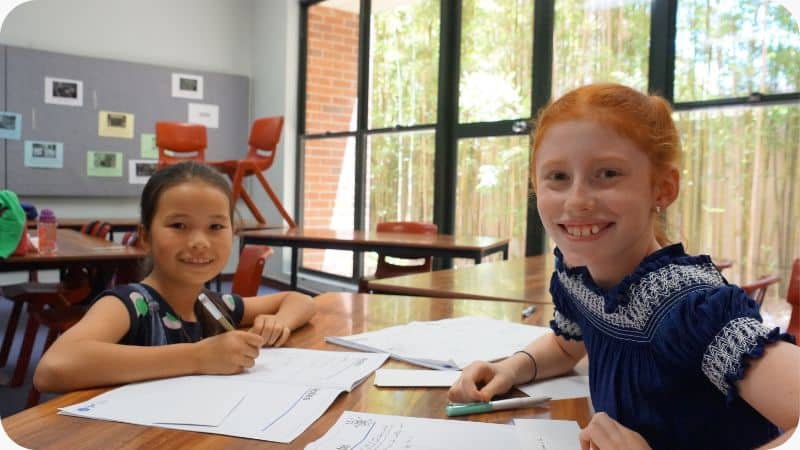
Do some post-debate research
You could even make a habit of quickly googling the topic after the debate so you can learn specifically what you wish you would’ve known during the debate. If you kept this habit up after every single debate, you would end up knowing a lot about the world and you would always end up even more prepared for the next topic that comes your way.
This is a great way to continue learning and expanding your debating skills even after the debate has ended. It can be difficult to find the motivation to keep learning about a topic once you’ve already had the debate, but if you make it a habit it can really pay off in terms of your future debating success.
In order to be a successful debater, it’s important to have strong general knowledge about a variety of topics. Luckily, you can use the strategies that we’ve outlined in this blog post to help improve your understanding of different areas. Remember to keep practising and expanding your knowledge so that you are ready for any debate topic that comes your way! If you want to learn more about how to become an excellent debater, check out our wide range of courses and resources specially designed to help you build up your confidence and teach you all the necessary skills.

That concludes our post on how to develop strong general knowledge for debating. We hope you found it useful and that you will put some of these strategies into practice the next time you engage in a debate. Good luck!
When we spend lots of time working on our debating and public speaking skills, it can be easy to get bogged down in the details and lose sight of the original purpose of these activities. Ultimately, the reason we engage with debating and public speaking in the first place is to persuade our audience to see our way of thinking.
Sometimes you might notice yourself giving a robotic delivery of your speech because you have practiced it so many times in front of your parents it feels almost automatic. Other times, you might find yourself expecting people to understand what you mean without realising that they might have a really different opinion on the issue you are speaking about than you do!
One of the most exciting skills you can develop through debating or public speaking is learning how to persuade the audience to see your point of view and how to influence their way of thinking on a topic.
This blog post will talk about strategies that you can use to regain your focus on persuading and influencing the audience through a variety of speech writing and speech presentation tips.
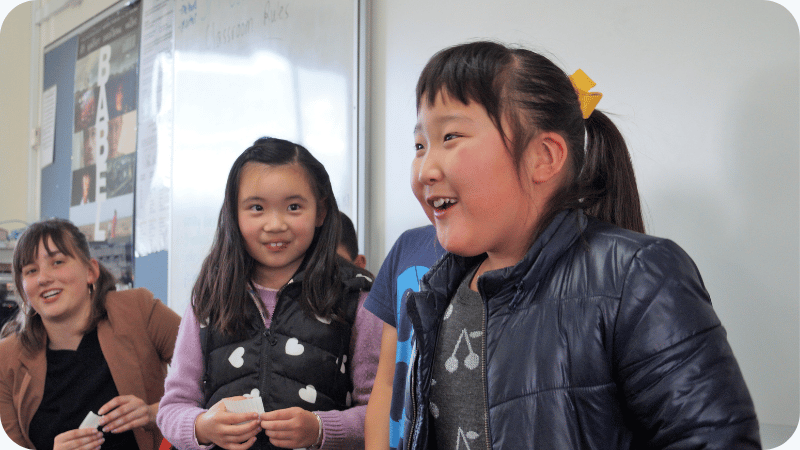
Tip #1: Empathise With Your Audience
One of the biggest barriers to persuasion can be a lack of empathy for the listener. Often as debaters and public speakers we can get a little bit caught up in our own heads, especially if we are really stressed about doing well at presenting a speech or having enough ideas to say during the debate. We can often forget to think about anyone other than the other team or the other people competing in the public speaking competition. We can forget that it is equally (if not more) important to think about the audience! We need to cater to their needs and attempt to understand what it’s like from their point of view.

When giving a speech, presentation, or argument in a debate, try to remember that:
Remember the audience is less familiar with the topic than you.
One general truth about the audience (and the adjudicators or judges) is that they are generally less familiar with the topic you are speaking about than you are. This is true in a couple of different ways.
Public Speaking
If you’re talking about public speaking then it’s highly likely that the audience and adjudicator haven’t done as much research into your topic area as you have. For example, imagine you are giving a speech about Global Warming. While you might know all of the context and all of the information that there is to know about climate change and global warming, it might be equally true that somebody in your audience doesn’t have much knowledge on this topic area at all! They might not even know the most common things that are going on in the news around this topic. When you walk into the room with a lack of empathy for your audience, you might be thinking about the presentation from your point of view: you know all of this information to the point where some of it is even boring to you! So, it’s really important to take the step of having some empathy for your audience.

How to build empathy for the audience and give a more convincing speech
Try saying to yourself: “Imagine if I was hearing my speech for the first time and it was the only thing I had ever heard on this topic area.” Then, ask yourself the following questions:
- Would I be confused?
- Would I be inspired or motivated?
- Is it necessarily true that I would naturally care about this issue?
- Do I need the speaker to convince me that I care about this issue?
Taking a second to ask yourself these questions and imagining how you would respond as an audience member or an adjudicator can help to build your empathy and make you more aware of their needs during your presentation. This will make you naturally more persuasive to them!
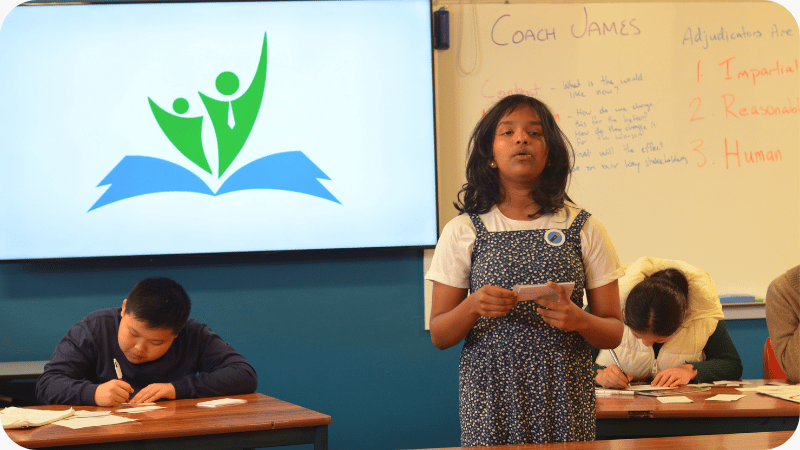
Debating
Another example is during debating. In debating, we often receive a topic and have one hour or so to prepare. Then we go into the room to participate in the debate. As a debater, from your point of view, you have been thinking about the topic of this debate for at least one hour (and it’s probably the only thing you’ve been thinking about for one hour). However, is this necessarily true of your adjudicator or your audience? In a lot of circumstances, the audience members might show up to a debate and not even know what the topic is going to be! They may just be interested in being there to see you speak even though they don’t really know what you’re going to be speaking about.
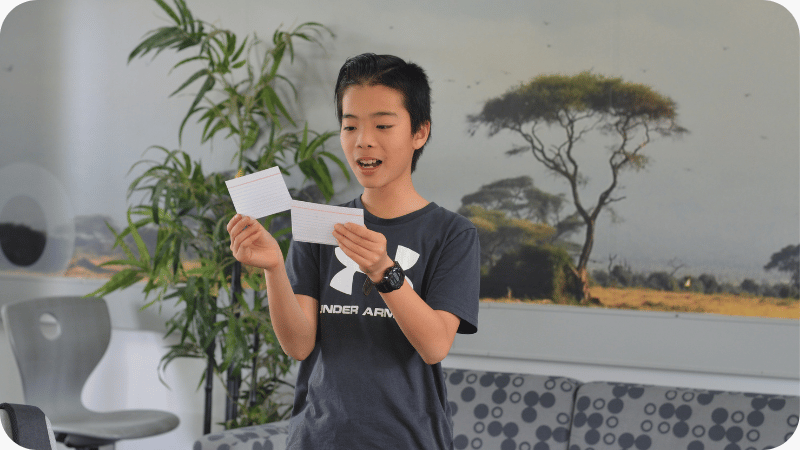
Even your adjudicator might not know what the topic is before they get into the debate room. In debating competitions there is often a topic selection. Your adjudicator will need the debaters to confirm specifically what topic they will be speaking about. That usually happens about one minute before the first speaker gets up to talk. That means that the adjudicator hasn’t been lost in the world of this topic for an hour as you have. They might have just been thinking about what they want to have for lunch that day or having a conversation with one of their friends about their job! So to get started in your speech, you can’t just launch into the deepest part of the topic area without explaining why people should care about it or its importance to the audience.
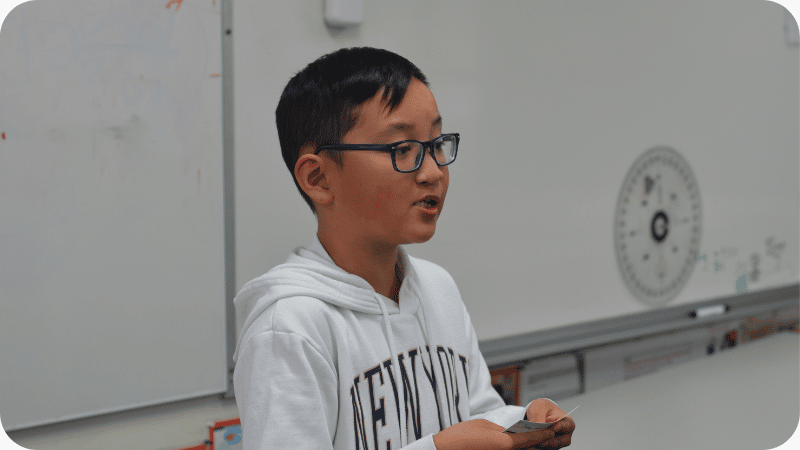
How to build empathy for the audience and give a more convincing argument
Luckily there are a few simple things you can do to alleviate this empathy gap.
- Clearly state the topic within your speech
- Make sure to define any confusing words with multiple meanings within the topic
- Offer some points of context that allude to the key issue of this debate
- Use the linking step of ‘PEEL’ to clearly link back to the topic at the end of each argument so people know why your argument is relevant.
- Remind yourself when you get to the debate that not everybody knows this is what we’re talking about tonight. Not everybody has been thinking about this as much as I have!
- Ask yourself: “What can I do to make this speech more clear and interesting for the people who are listening?”
Tip #2: Assume the audience does not believe you
This tip is about ethos, which is a way of convincing an audience that you are credible and trustworthy. In order to have ethos, there are three things you need to do:
First, you need to establish your credibility. You need to remind the audience of your experience or expertise on this topic. This can be done by sharing a personal story or using statistics and data.
Second, you need to show that you care about the issue at hand. This can be done by sharing your passion for the topic or by highlighting how it has affected you or others in a positive way.
Third, you need to build trust with the audience. This can be done by being transparent about your intentions and by admitting when you don’t have all the answers.

When it comes to ethos, there is one common mistake that people make: they assume that the audience already believes them. This is a mistake because it leads to people being complacent in their speeches and not working hard enough to establish their credibility, show that they care, or build trust.
The best way to avoid this mistake is to assume that the audience does not believe you. This may seem counterintuitive, but it will actually make you work harder to establish your credibility, show that you care, and build trust. And in the end, this will make your speech more effective.
Tip #3: Use concrete language
When it comes to persuasion, one of the most important things you can do is use concrete language. Concrete language is specific and vivid. For example, an example is a form of concrete language, when you explain how something has happened in the real world. This helps the audience visualise what you’re talking about. And when people can visualise what you’re talking about, they’re more likely to be persuaded by your argument.
There are two common mistakes people make when it comes to using concrete language. First, they use too much abstract language. Abstract language is general and vague. It doesn’t help the audience visualise what you’re talking about. For example, in a speech about climate change you might say, “It helps to take action.” This is very abstract – what kind of action? What does it help? Second, they use too much jargon. Jargon is technical language that is only understood by people in a particular field or profession, such as terms like ‘carbon neutral’, ‘mitigation’, and ‘tipping point’ which are used by climate change experts. Using jargon in your speech will only make it harder for the audience to understand and follow your argument.
The best way to avoid these mistakes is to use concrete language. When you use concrete language, be specific and use vivid verbs and adjectives. And when you use jargon, make sure to explain it in simple terms so that everyone in the audience can understand.
Tip #4: Use emotion
Emotion is a powerful tool that can be used to persuasively argue your position. When you tap into emotions, you’re more likely to get people to agree with you. And when people agree with you, they’re more likely to take action on your behalf.
There are two common mistakes people make when it comes to using emotion in their speeches. First, they use too much emotion. This can make people feel overwhelmed and turned off by your argument. Second, they use the wrong emotions. This can happen when you try to evoke an emotional response that is not appropriate for the situation or when you try to tap into emotions that are not relevant to the issue at hand.

The best way to avoid these mistakes is to use emotion strategically. Only use as much emotion as necessary to get your point across. And be careful to only use emotions that are appropriate for the situation and that are relevant to the issue at hand.
If you follow these tips, you’ll be well on your way to becoming a more persuasive speaker. Just remember to be clear, have empathy, and use emotion strategically. Do this, and you’ll be able to persuasively argue your position and get people to take action on your behalf, which is the whole point of delivering a speech, a presentation, or an argument.
When it comes to helping our kids succeed in school and in life, we as parents will go to great lengths. We want them to have every opportunity to build the skills and knowledge they need to be successful. Often, we invest in extracurricular activities like sports and music lessons to give them a well-rounded education.
But have you ever considered enrolling your child in a public speaking or debating course?
While it may not seem like an obvious choice, these courses can actually offer several benefits for your child. From developing confidence and communication skills to learning how to think on their feet and problem solve, debating and public speaking courses can give your kid a leg up both academically and in their future career.
Here are just a few of the ways in which these courses can benefit your child.
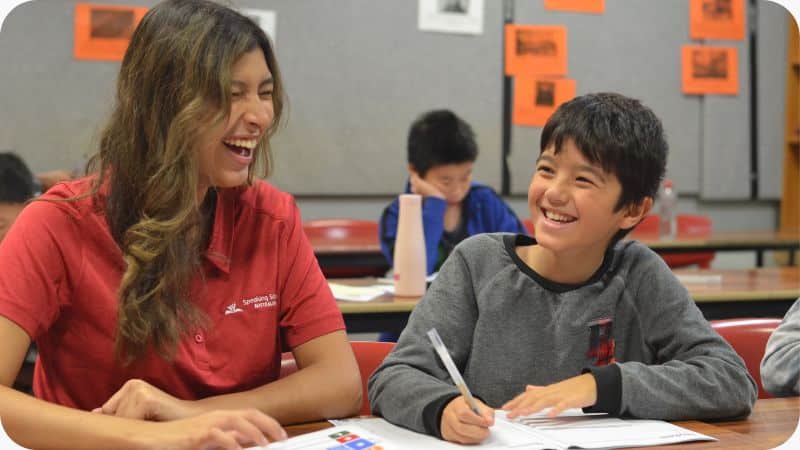
Confidence & Communication Skills
One of the most natural benefits of enrolling your child in debating or public speaking classes is that it will help them to build confidence and communication skills.
Being able to stand up in front of a group of people and speak clearly and confidently is a skill that will serve kids well both academically and professionally. In today’s increasingly digital world, good communication and presentation skills are more critical than ever. Helping your kid build these public speaking skills early on will give them a significant advantage both in their classes now, as well as in whatever future career they may have.
But how do structured public speaking programs (such as those offered by Speaking Schools Australasia) help in building confidence and communication skills?
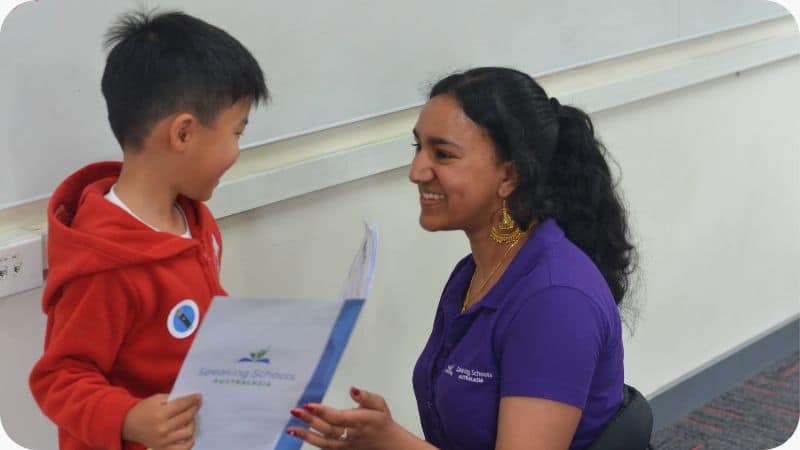
Practice makes perfect
Firstly, simply put, public speaking classes give any student the opportunity to practice presenting a speech.
By enrolling in regular school holiday workshops or weekly classes, your child will have the chance to speak in front of their peers on a regular basis, helping them build their public speaking and debating skills. This will not only help them to become more comfortable with public speaking, but it will also give them the opportunity to receive plenty of individualised feedback that they can implement in the following session, using cyclical learning patterns to teach kids how they can improve continually.
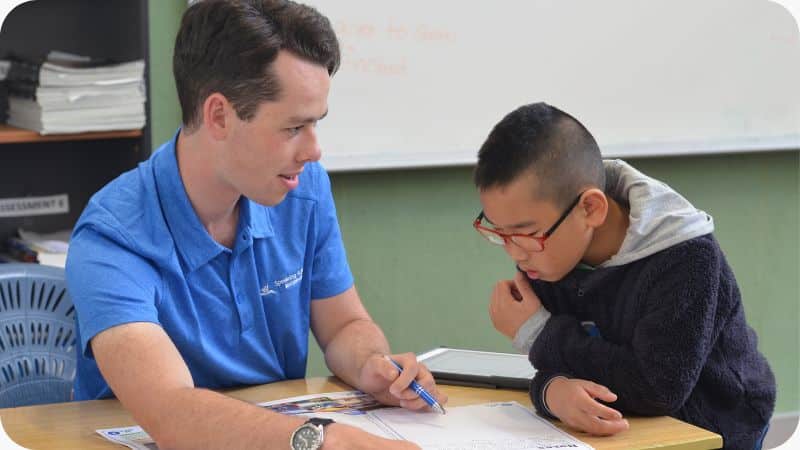
Developing an interest in topics
Secondly, in many cases, the topics covered in presentation skills programs will be of interest to kids and get their creative writing juices flowing.
Speaking Schools Australasia uses a combination of high energy and fun games with topics that students actually enjoy talking about to ensure that there is enthusiasm instilled in every class.
This means that they are likely to be more engaged and enthusiastic about participating, both in public speaking classes, and more generally when they want to speak out in life. When kids (and realistically adults) are interested in what they’re doing, they’re more likely to do well and build their self-confidence.
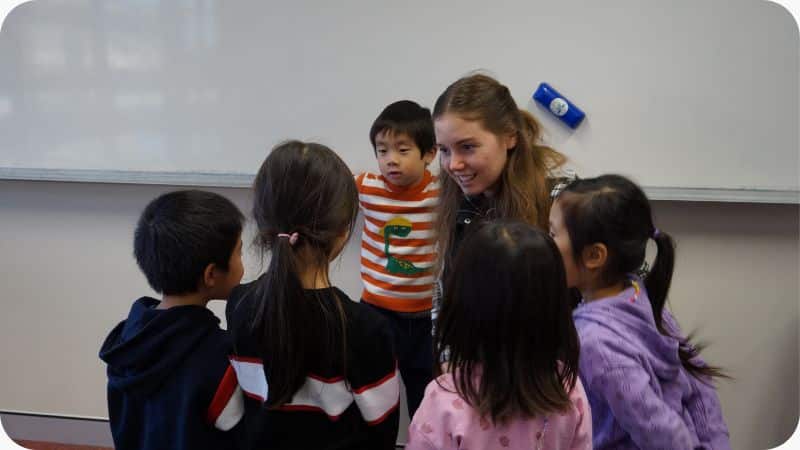
Finding the fun in developing presentation skills
Thirdly, kids actually begin to find that public speaking can be fun.
When done correctly, public speaking shouldn’t be about reciting memorised lines or reading from a script, such as in performing arts classes. Rather, it should be about engaging with an audience and sharing something that you’re passionate about, using your voice and body language to help convey why that’s the case.
When kids find the fun in public speaking, they’re much more likely to want to participate. This is when they really start to develop their confidence and communication skills.

How can public speaking classes help?
At Speaking Schools, we run public speaking classes that are aimed at boosting every kid’s confidence and turning them into capable communicators.
By using a combination of structured workshops, small groups and excellent teachers, young people of all ages are able to develop their self-esteem and presentation skills in a supportive and welcoming environment. By giving students multiple opportunities to speak and present at least one speech every session, they’re given the opportunity to build confidence and develop valuable life skills that will follow them throughout life.
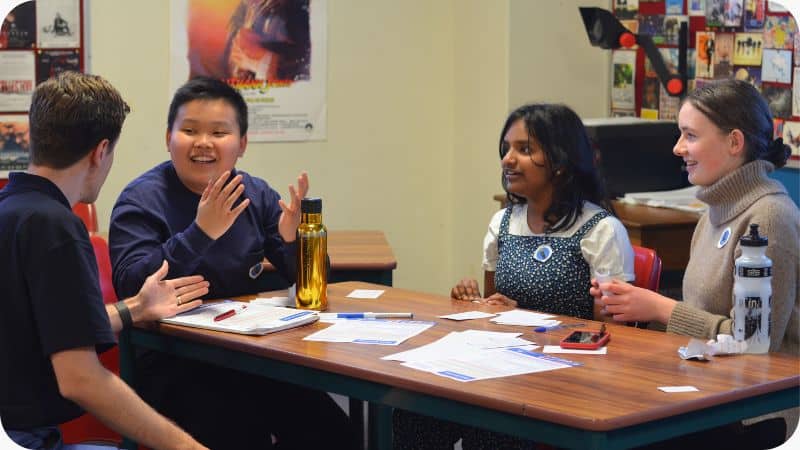
Problem Solving & Critical Thinking Skills
Another benefit of public speaking and debating courses is that they can help students develop critical thinking and problem-solving skills.
These skills are important because they enable students to think on their feet, come up with solutions quickly, and adapt to changing circumstances.
In a fast-paced world, being able to think critically and solve problems quickly is one of those valuable life skills that will give any student an edge in whatever they do – whether it be at school, in their jobs or merely prioritising things at home.
But how do debating and public speaking classes run by Speaking Schools Australasia help develop these skills?

Analysing both sides of an argument
One of the critical things that public speaking and debating courses do is encourage kids to look at both sides of an argument.
In many cases, there will be a particular topic that needs to be discussed (and often debated). Students will be able to choose their own side of the topic, or if they’re involved in a debate, be split into two groups, with each group arguing for or against the topic. Having chosen (or been assigned), students will then need to consider a broad range of ideas to determine the strengths of their case, and what might make a persuasive argument.
This encourages students to analyse both sides of the argument and to think about the points that need to be made to persuade their audience (or win the debate). In doing so, they develop strong critical thinking and problem-solving skills, which are both essential for any child’s education.
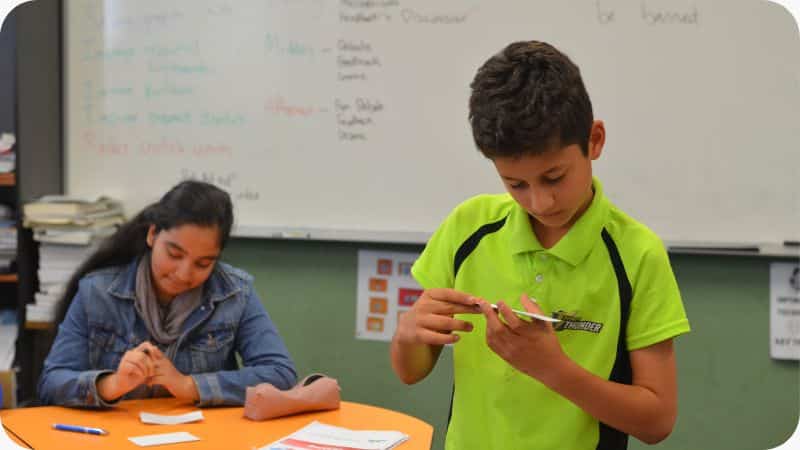
Considering ideas on your feet
Another way in which public speaking and debating courses help build critical thinking and problem-solving skills is by encouraging children to think on their feet.
In a debate, for example, children will need to listen to the points made by the other side and then respond quickly with a rebuttal. This encourages them to think quickly and come up with solutions on the spot, which is an important life skill in both school and the workplace.
Similarly, when preparing for a public speaking event, students often have to use their creative writing skills to come up with interesting ways to capture their audience’s attention and deliver their message effectively. This too requires quick thinking and the ability to problem-solve on the spot and helps teach children how to be more confident communicators.
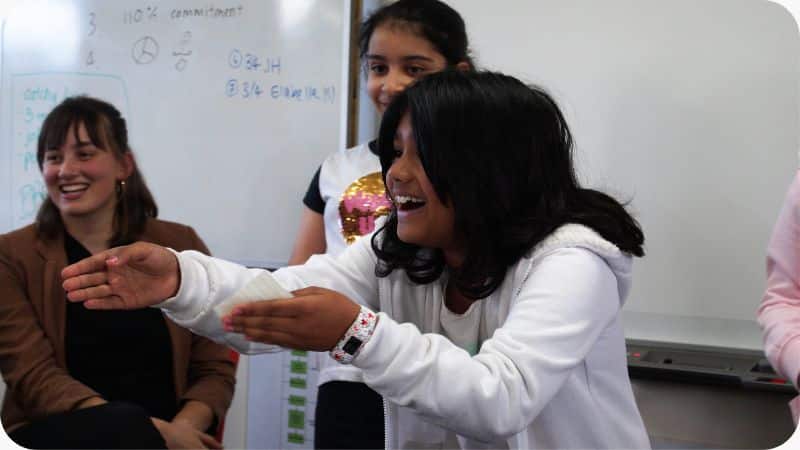
Thinking clearly under time pressure
A third way that public speaking and debating can help build a child’s critical thinking skills is by teaching them how to consider the implications of a topic quickly and effectively.
In many cases, children will only have a limited amount of time to think about a topic before they need to present a coherent speech to their audience. This process encourages them to find the most essential information quickly and to use that information effectively when speaking to their audience, all the while under strict time pressure and potentially discussing ideas that they lack expertise on.
The internal knowledge that you can speak with authority without much preparation time is the self-confidence boost many kids need – and something that can only really come with experience.

How can Public Speaking Courses for Kids Help?
These are all valuable life skills that will serve your kid well both in school and in their future career – being able to see both sides of an issue and argue effectively without prompting is a skill that is increasingly valued in today’s society, and something that can really boost any child’s confidence.
By enrolling your kid in one of these courses, such as those run by Speaking Schools, you can help them develop the skills and self-esteem they need to be successful now and into the future.
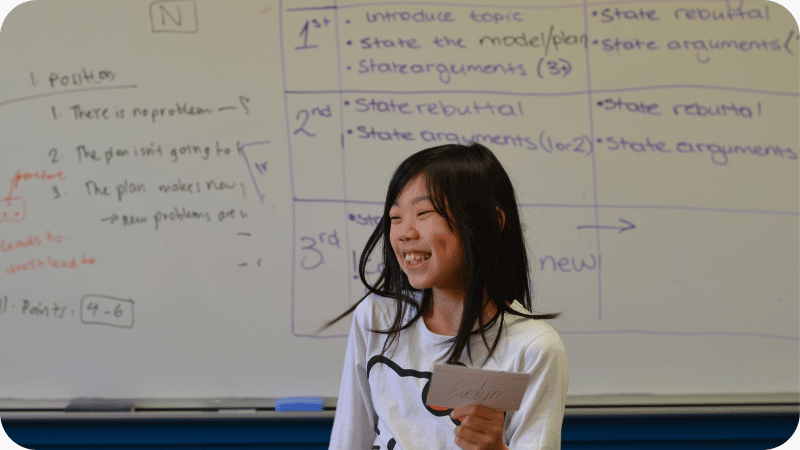
Teamwork Skills
At its core, debating is a team activity – whilst individual performance is important, students win and lose as a team.
This is important because it teaches children the value of teamwork and how to work effectively with others. These essential skills will be useful not only in their academic and professional lives, but their .
But how can debating courses help children to develop essential teamwork skills?
Working together towards a common goal
One of the critical things that debating teaches children is how to work together towards a common goal.
To be successful in a debate (or a group presentation), team members need to be able to trust and rely on each other. They also need to be able to communicate effectively and work together to come up with the best possible arguments, both in the prep room and then out in the debate itself. This requires not only the self confidence to speak up and make their voice heard, but also ensuring that they are able to listen to others and reach compromises – something that every parent hopes their kids
This encourages children to see the value of teamwork and to understand how important it is to be able to work well with others.
Developing leadership skills
In addition to teaching children how to work well with others, debating courses can also help them to develop leadership skills.
Each debate team (or group presentation) will usually have one or two children who take on the role of an informal ‘leader’. This means that they are partially responsible for coordinating the team’s activities, from preparing the arguments to be used in the debate to giving instructions to the other students on what needs to be done during prep.
Being a good leader is more than being bossy – you need to be interested in what you’re doing, know how to give voice to your ideas and often show body language that demonstrates you are a person worth listening to.
Every parent wants their kid to be a leader, and public speaking and debating classes are an excellent way for children to develop leadership skills and learn how to take charge in a team environment (whilst also helping them understand the importance of clear communication and effective organisation).
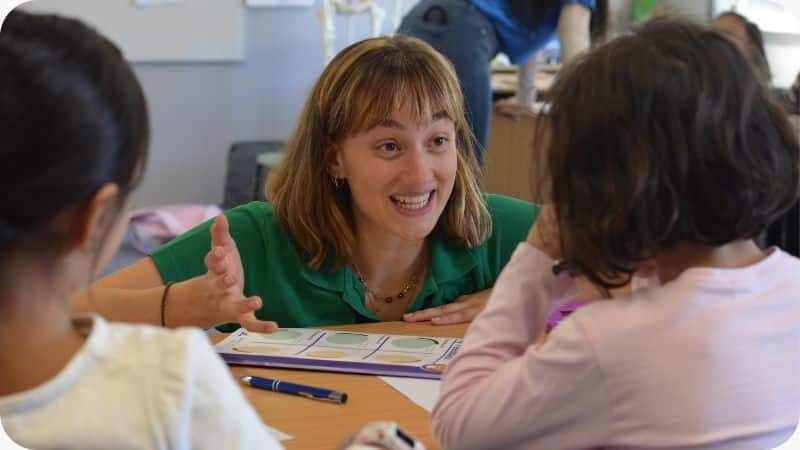
Learning from mistakes
Finally, debating and public speaking classes can also help children to learn from their mistakes.
In any speech, there may be times when things don’t go as planned or when a team makes a mistake. This is all part of the learning process, and it provides an excellent opportunity for children to learn how to deal with setbacks and how to bounce back from them. This is how resilience in built – the idea that no matter what happens (whether at school or in life), we can bounce back.
This is an essential skill that students carry with them throughout their lives, and a skill that every parent wants for their kids.
How can a course help build these public speaking skills?
Speaking Schools Australasia offers a range of debating and public speaking classes and workshops that help kids of all ages work on these skills in a fun and welcoming environment to help effect positive change.
Each school holiday and weekly term course we run has a structured program with clear learning outcomes that places the focus squarely on the students attending the workshops – our goal is to help them find their own voice so they can share their thoughts and passions with the enthusiasm they deserve.
So what next?
Enrolling your child in a public speaking or debate course can offer several benefits, from engaging classes to developing confidence and communication skills to learning how to think on their feet and problem-solve to working better as a team and a leader.
Whilst there are many providers out there, Speaking Schools offers everything that a parent might be looking for in a program. At Speaking Schools, we:
- Utilise classes with fewer students than other providers, to ensure that every student has the opportunity to present a speech and receive feedback every lesson;
- Provide a range of school holiday and after-school weekly term programs that are specifically designed to ensure that every student presents a speech each and every session;
- Have both in-person and online classes at a range of venues to suit parents’ scheduling needs;
- Use the Speaking Syllabus, a custom-built set of resources specifically designed to bring out the best in our students across all our classes, teaching children resilience and helping them build confidence that they will carry with them well after school; and
- Accept Creative Kids Vouchers for all NSW-based students, helping save their parents a bit of money!
If you’re looking for programs that will give your child a leg up and help your them be their best self, look no further than Speaking Schools – with a public speaking program for students of all ages and the best debating classes Sydney-wide, there is no better time to join a course than today!
Giving a speech in front of your classmates is a daunting task, but it can also be a lot of fun! If you’re not sure where to start when it comes to choosing a speech topic, don’t worry. We’re here to help. In this blog post, we will give you some tips on how to come up with the perfect speech topic for your school presentation, as well as introduce you to some great speech topic ideas for kids.
Sometimes, your school will make things easy for you and tell you exactly what topic to speak about. Other times, you may have complete freedom in your topic selection, or even need help refining a broader topic idea into one that is best suited for you. Either way, this blog post is sure to help you choose the topic for your next speech.

Brainstorm a list of topics that interest you
It can be tricky to come up with the perfect topic for a school speech. After all, you want to find something that is interesting and informative, but also something that isn’t too controversial or overly complicated. The best place to start is by brainstorming a list of speech topics that interest you.
Coming up with a list of potential speech topics for a school speech can seem daunting, but it doesn’t have to be. One way to narrow down your topic options is to think about the speeches you’ve enjoyed hearing in the past. What made those speeches enjoyable? Was it the topic, the speaker’s delivery, or both? Another option is to consider your audience. What would be a topic that would interest them? Once you’ve considered those factors, you can start brainstorming a list of possible speech topics.
Some general topic ideas could include:
- Overcoming obstacles
- Following your dreams
- The importance of friendship
- The power of kindness
- Your most embarrassing moment
- Your favourite kind of something: favourite sport, favourite subject, favourite food, favourite restaurant, favourite outdoor activity, favourite time of year, favourite place, favourite animal, etc.
- If you won a million dollars, what would you do with it?
- What was your happiest day?
- Your greatest fear
- Persuasive speeches arguing that a topic is or is not true (e.g. that kids watch too much TV, that technology does more harm than good, that all families should have a pet)
However, ultimately the best topic for your speech will be one that is personal to you and that you feel passionate about. So think about what topics are important to you and what message you want to share with your audience. Once you have a few ideas in mind, you can start narrowing down your list until you find the perfect topic for your school speech.
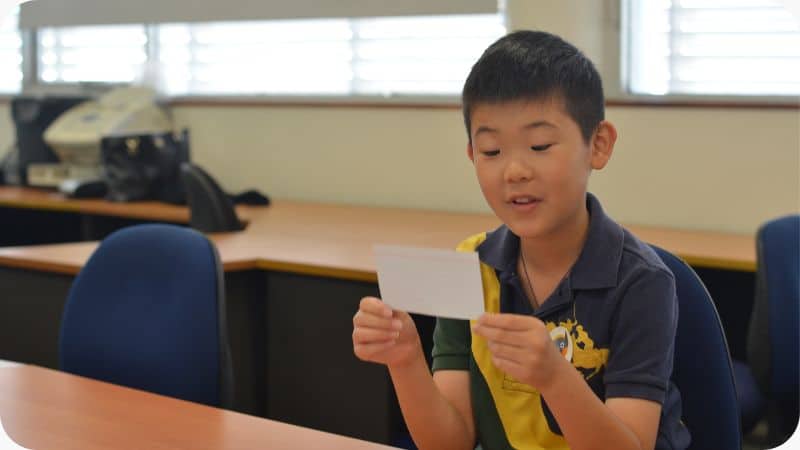
Narrow down your list to a few speech topics that you feel passionate about
Once you have a few ideas, try to narrow down your choices by considering the following factors:
- Is this topic something that I’m passionate about?
- Will my audience be interested in this topic?
- Is this topic appropriate for a school setting?
By taking the time to carefully consider these factors, you’ll be well on your way to finding the perfect topic for your next school speech.
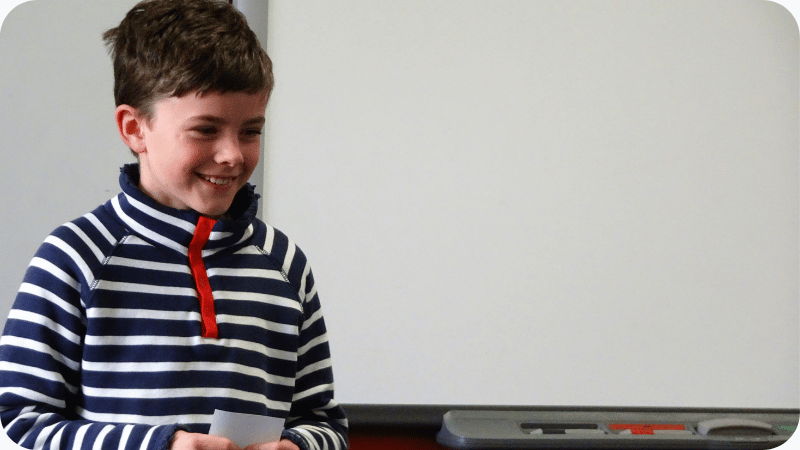
Decide on the purpose of your speech
Next, you should consider what you want your speech to accomplish. Are you looking to inform, entertain, or inspire your audience? Once you have a general idea of your goal, you can begin selecting a topic that aligns with it.
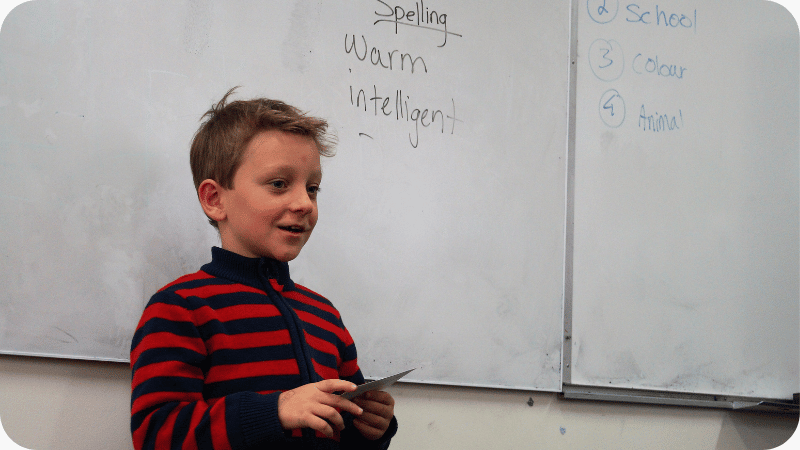
Persuasive Speeches
Persuasive speeches are speeches that are given in order to convince the audience to see a certain point of view or take a particular action. When choosing a topic for a persuasive speech, it’s important to consider what your goal is and who your audience is. For example, if you’re giving a speech to primary school students, you would want to choose a topic that is both interesting and age-appropriate.
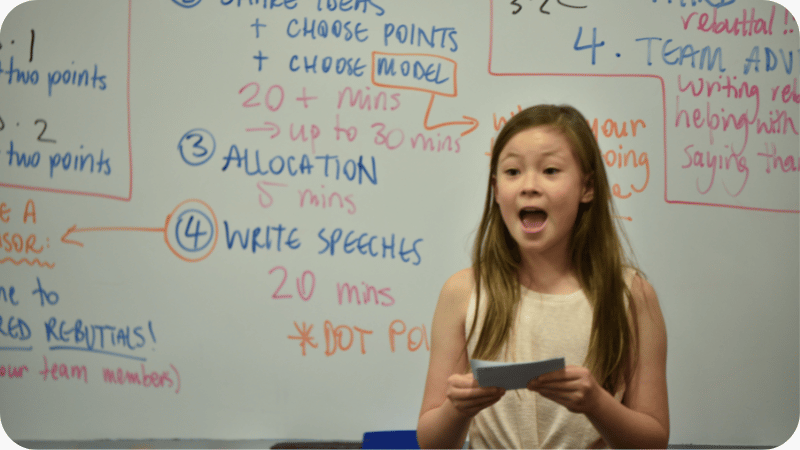
Informative Speeches
Informative speeches are speeches that are given in order to educate the audience about a particular subject. When choosing between informative speech topics, it’s important to select one that is both interesting and manageable. For example, if you’re interested in discussing the history of Indigenous Australia, you would want to choose a topic that is specific enough that you can cover it in the time allotted, but not so specific that you run out of things to say. There are lots of interesting speech topics to choose between when giving an informative speech. When you are considering different interesting speech topics, consider what would you find most interesting to learn about as an audience member. You could also look at some TED Talks to find examples of informative public speaking presentations that are intriguing for all sorts of people.
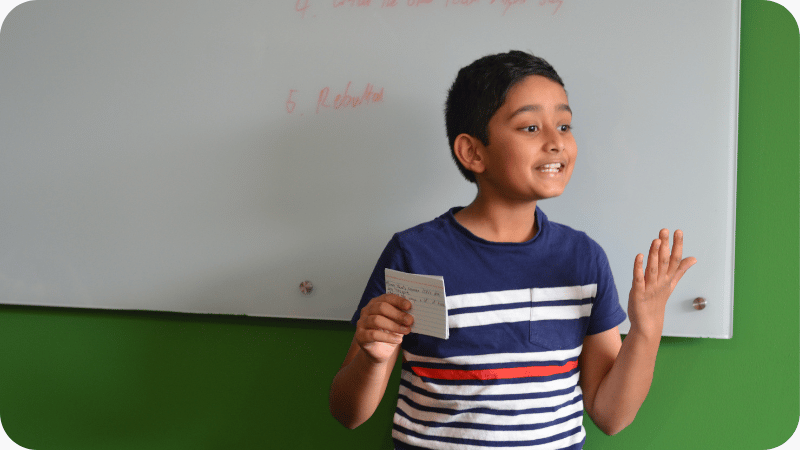
Entertaining Speeches
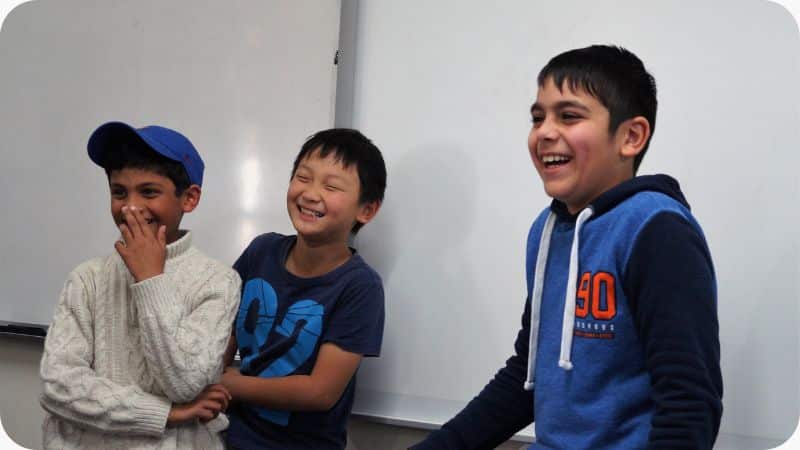
Entertaining speeches are speeches that are given in order to engage and delight the audience. When choosing an entertaining speech topic, it’s important to select one that is both fun and appropriate for the occasion. For example, you may want to write a funny speech and utilise humour while discussing your topic, or even talk about a funny subject like your imaginary friend or why the schoolyard is like another planet. Public speaking is a wonderful opportunity to have fun and make people laugh!
Choose the topic that you can talk about most confidently and convincingly
The best way to narrow down your choices is to think about what you’re passionate about and what you know the most about. Once you’ve zeroed in on a few potential speech topics, try to imagine how each one would work as a speech. For example, if you’re passionate about animals, you might choose to give a speech about the importance of animal shelters. But if you know more about history, you might choose to give a speech about Indigenous Australia. Ultimately, the key is choosing a topic you can talk about confidently and convincingly. So take your time, do your research, and pick the perfect topic for your next speech!
Speaking with confidence starts with feeling good about what you are talking about.
Choosing the right speech topic for kids can bring them to life and help them have a great time while practising public speaking and participating in a speech competition. Oratory skills are usually easier to master when you are feeling comfortable and excited about your speech topic. Some kids really enjoy being funny and will delight in crafting a humorous speech to share with the class. Other children may feel more confident giving an informative report about a detailed piece of information that they find interesting. Others will want to persuade the class that the world should change in some way, and have passionate thoughts on just what we should do to make the world a better place.

Do some research on the topic to make sure your information is up-to-date and accurate
Once you’ve chosen the topic for your speech, it’s important to do some research to make sure your information is accurate and up-to-date. A great way to find information on any topic is to search the internet, visit the library, or talk to experts on the topic. When you’re researching for a speech, it’s also important to consider your audience and what they might already know about the topic. If you’re giving a speech to kids in school, they might not need as much background information as someone who has never heard of the topic before. Public speaking can be a daunting task, but research will help you feel more confident and prepared when it’s time to give your speech. Try asking your parents and family if you can practice in front of them, and whether they notice any mistakes in the information when you speak!
By following these tips, you’ll be sure to find the perfect topic for your next school speech. Just remember to be passionate about your topic, do your research, and consider your audience. With a little bit of preparation, you’re sure to give a great speech that will engage and inspire your listeners. So get started today and good luck with your public speaking adventure!
If you would like to participate in a guided course that teaches you the ins and outs of public speaking, then check out our wide range of online and in-person public speaking courses. We have workshops teaching speech structure, topic selection, and speech writing, as well as public speaking skill development for all ages.
Looking for even more inspiration? You can find even more ideas in our blogs on public speaking topics and debating motions, or learn how to make an incredible speech here.